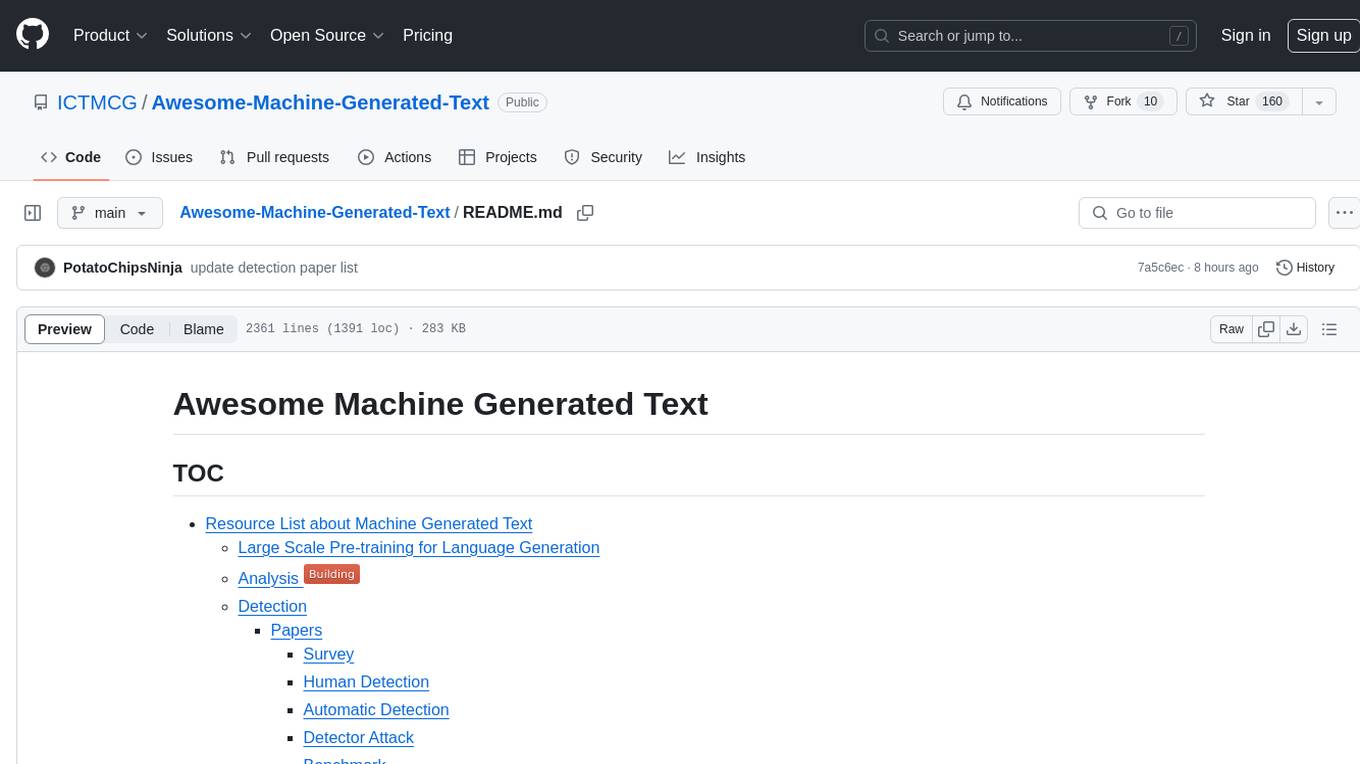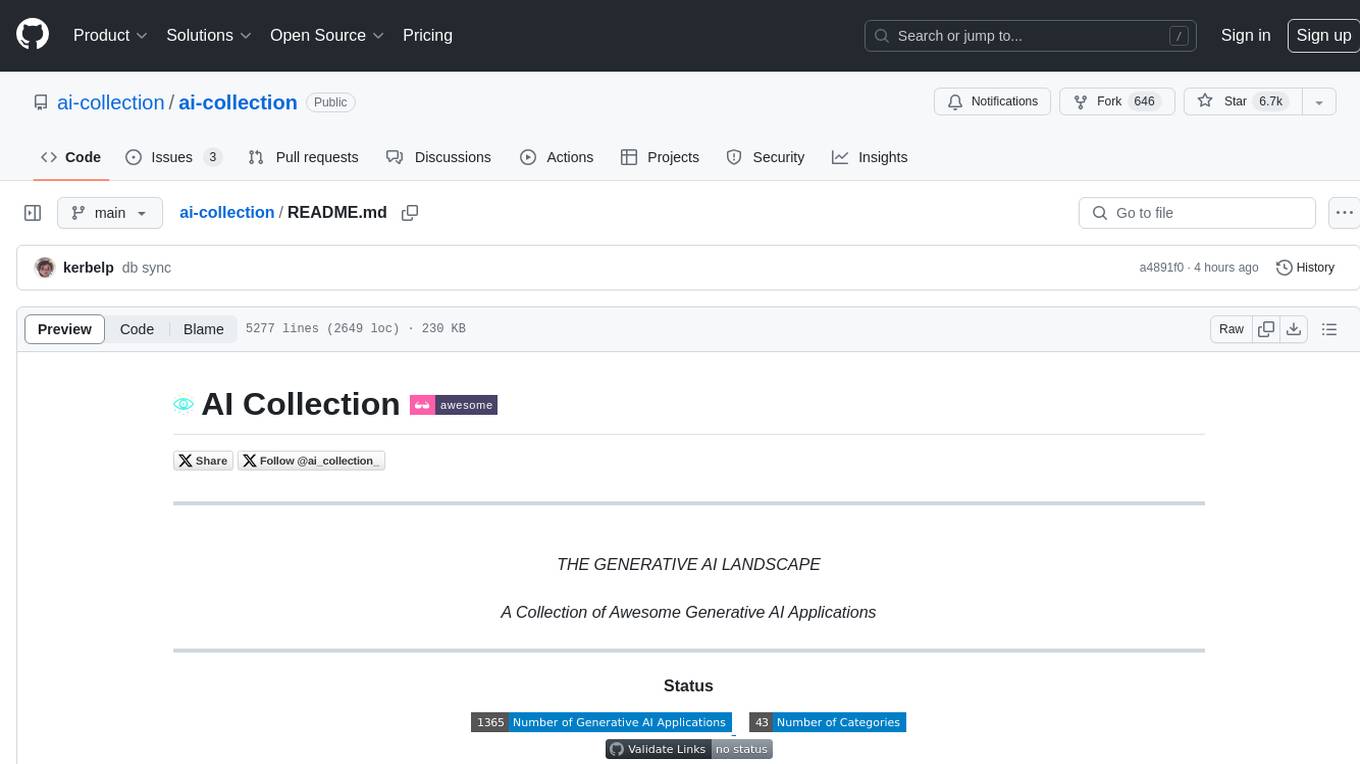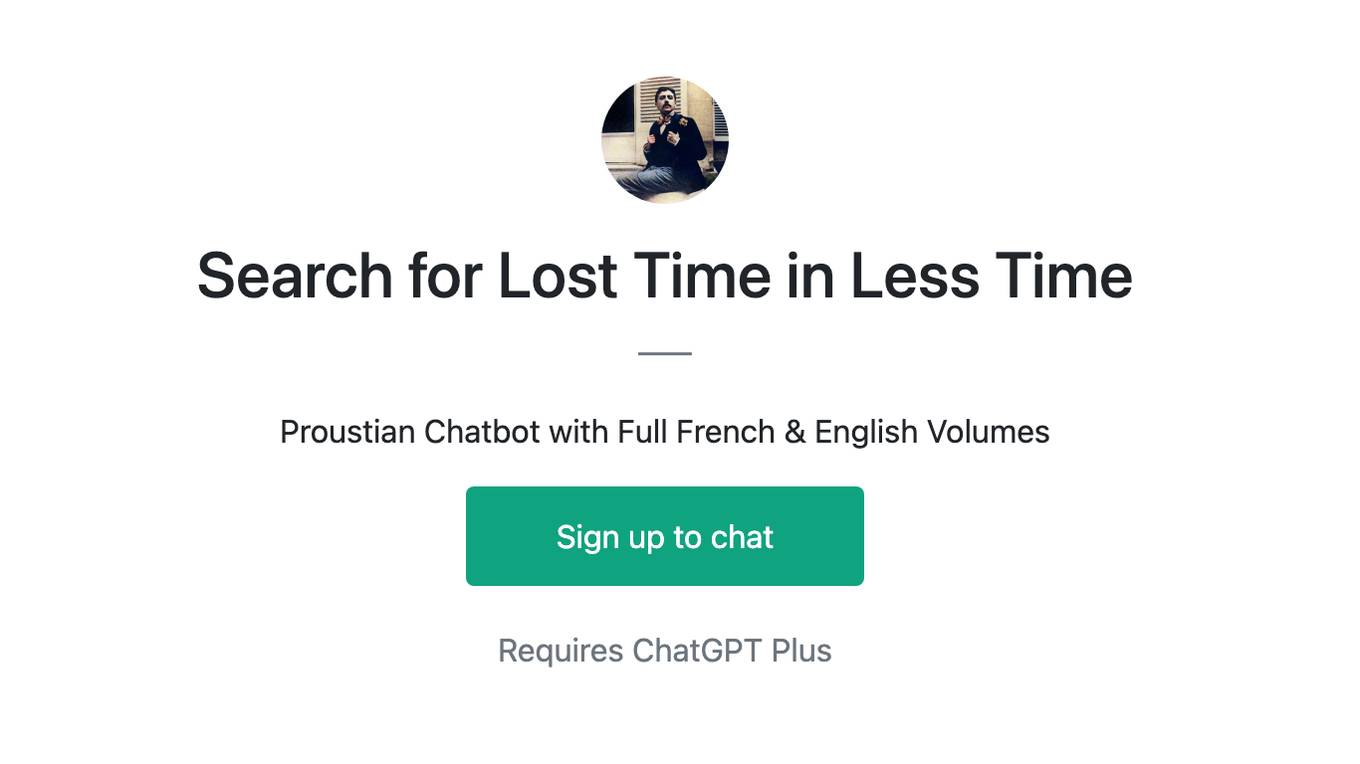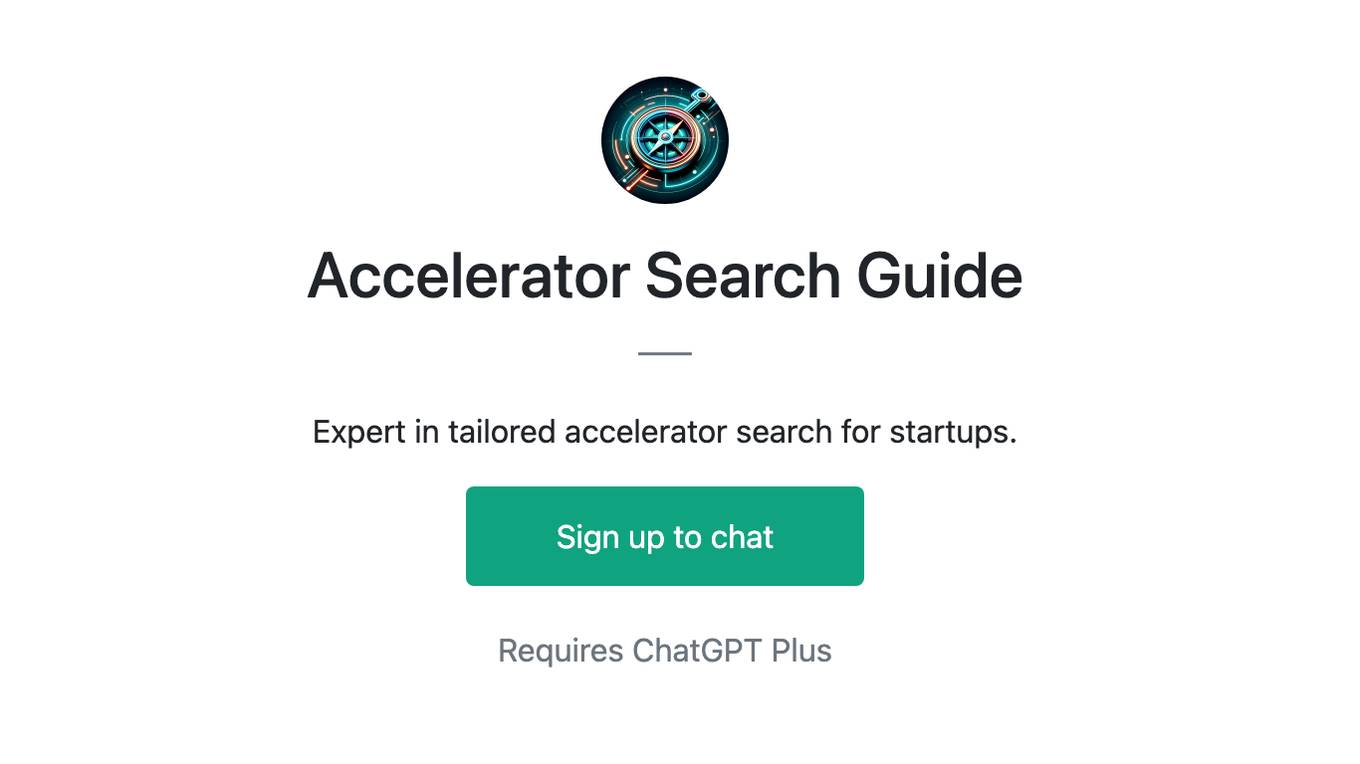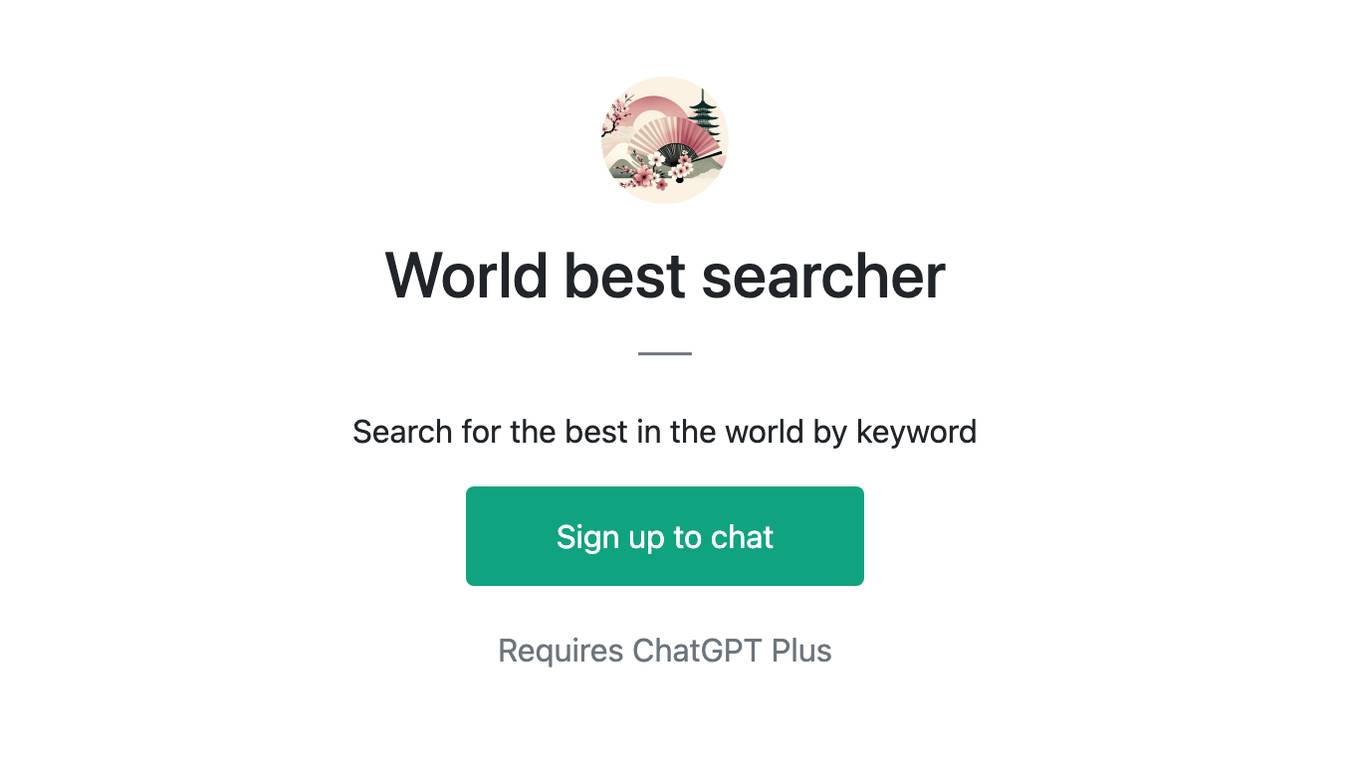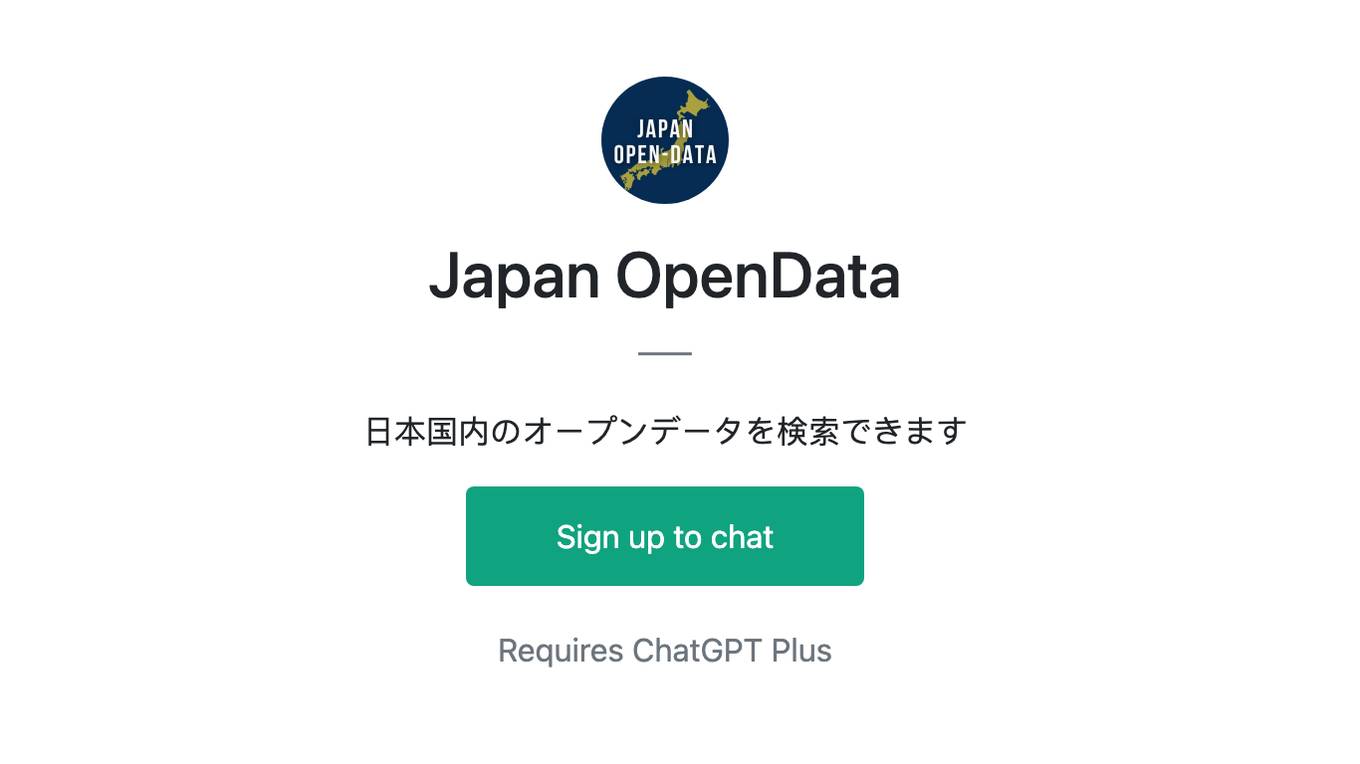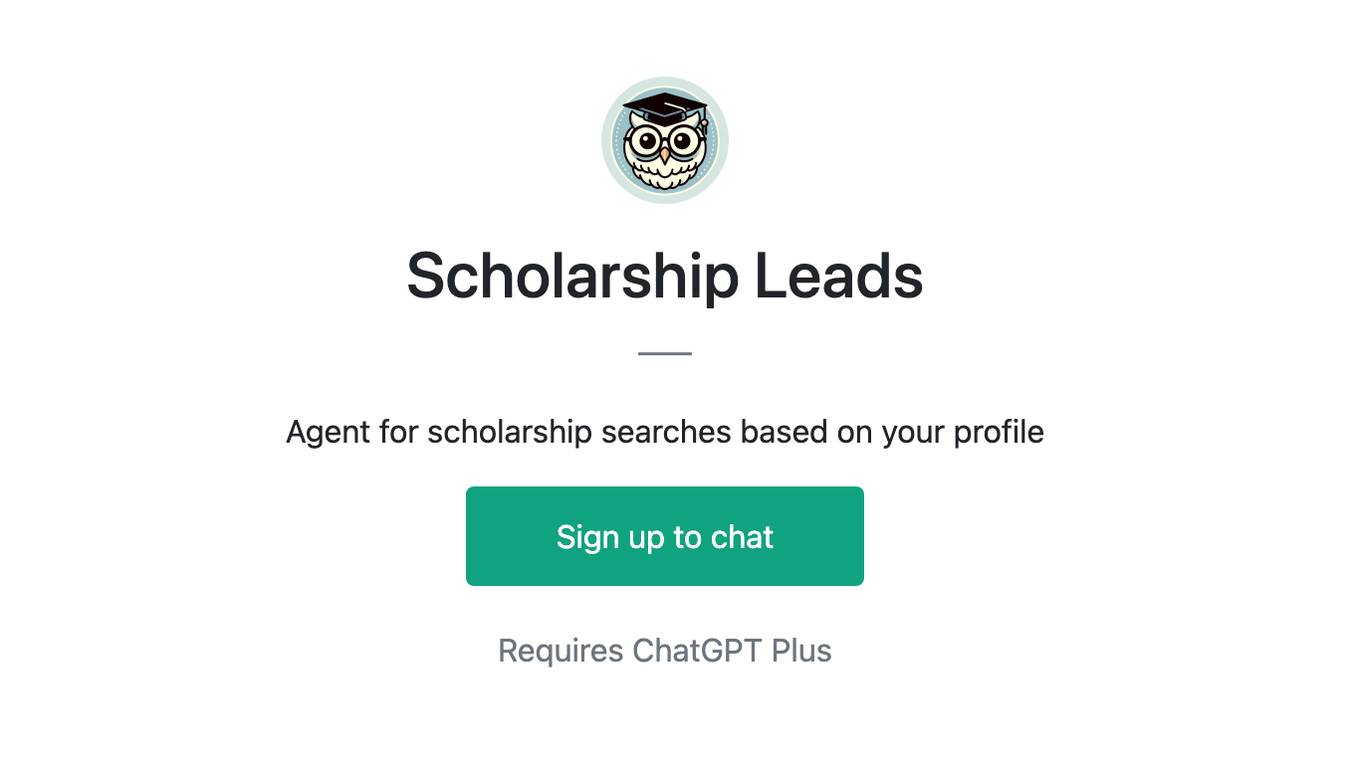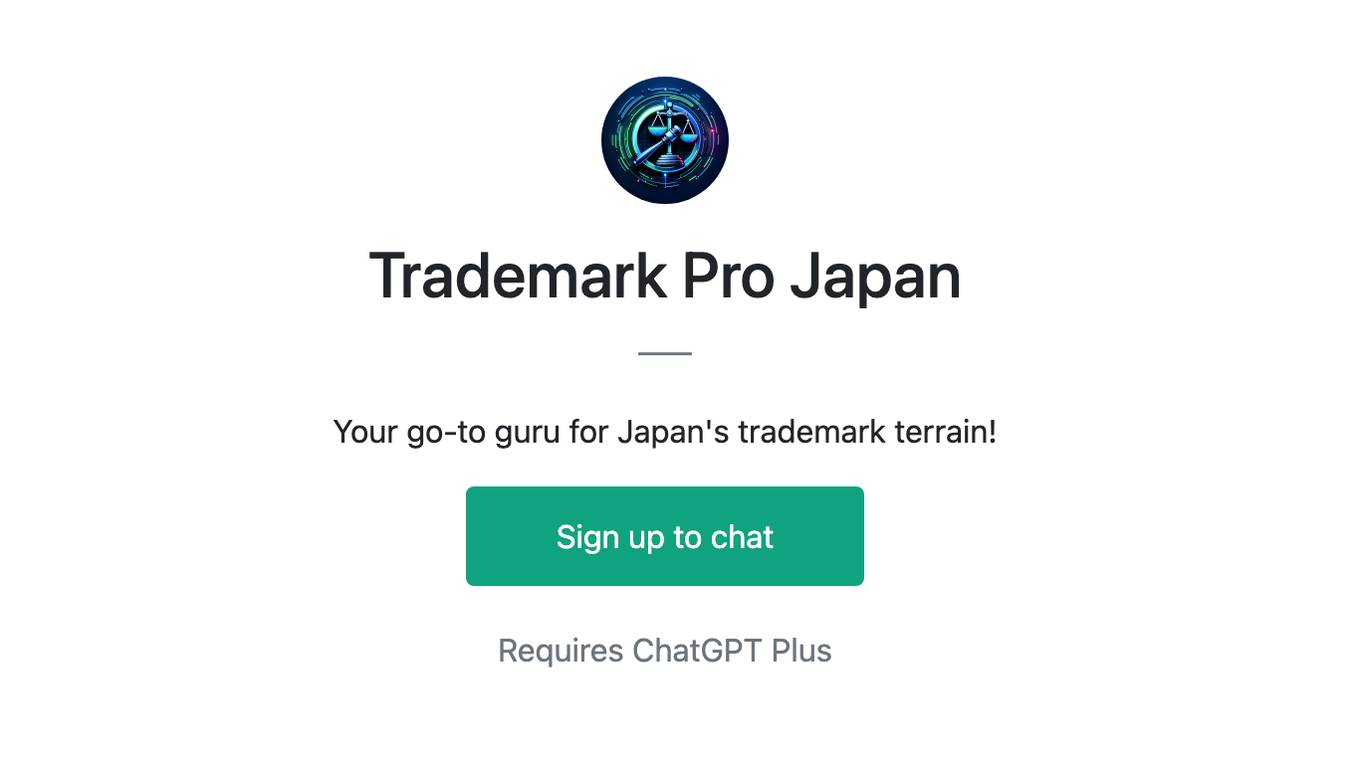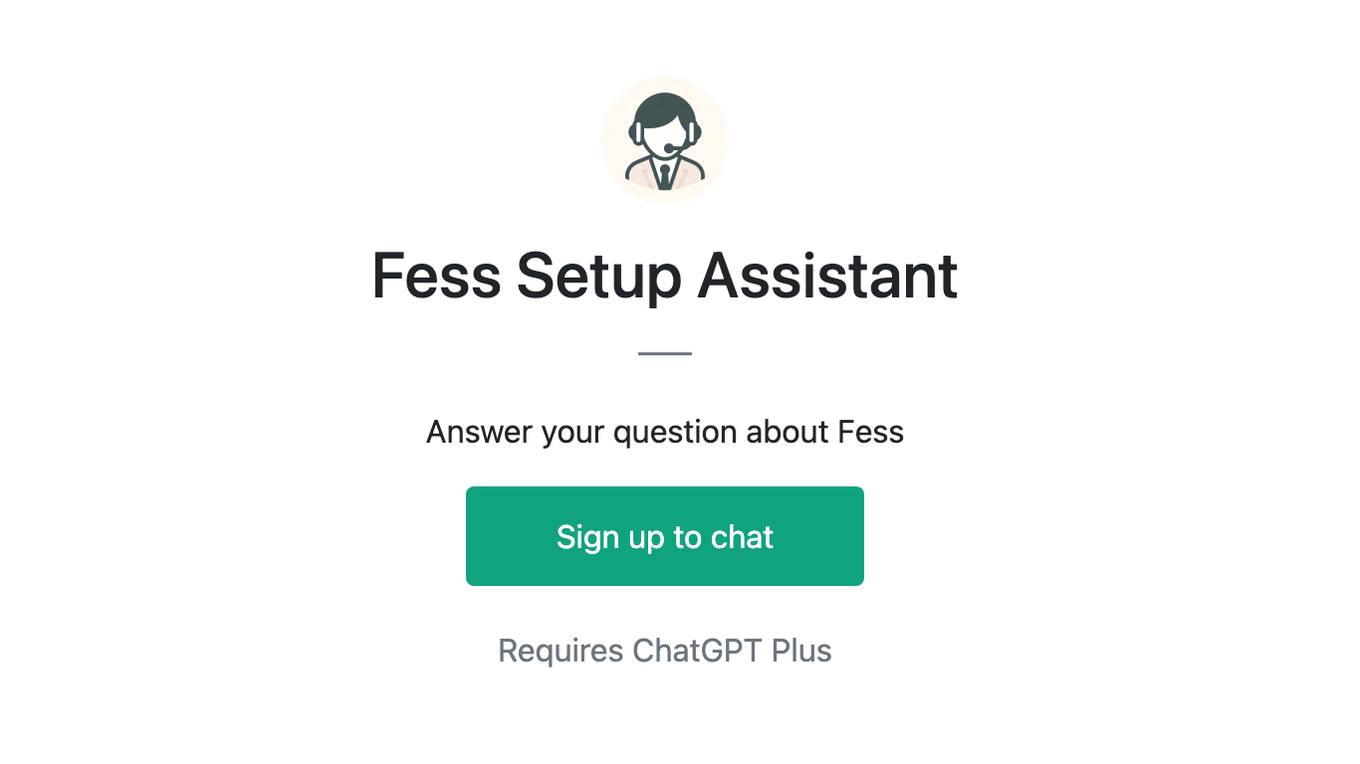Best AI tools for< search for hotels near me >
20 - AI tool Sites

Staypia
Staypia is a hotel reservation website that uses AI to find the best deals on over 3.16 million hotels worldwide. Staypia offers members exclusive discounts, and its prices are often lower than those found on other booking sites. Staypia also offers a variety of features, such as the ability to search for hotels near your location and to compare prices from multiple booking sites. Staypia is a great option for travelers who are looking for the best deals on hotels. Its AI-powered search engine makes it easy to find the perfect hotel for your needs, and its member-exclusive discounts can save you a lot of money. Here are some of the benefits of using Staypia: * Find the best deals on over 3.16 million hotels worldwide * Get exclusive discounts for members * Compare prices from multiple booking sites * Search for hotels near your location * Read reviews from other travelers If you're looking for the best deals on hotels, be sure to check out Staypia.
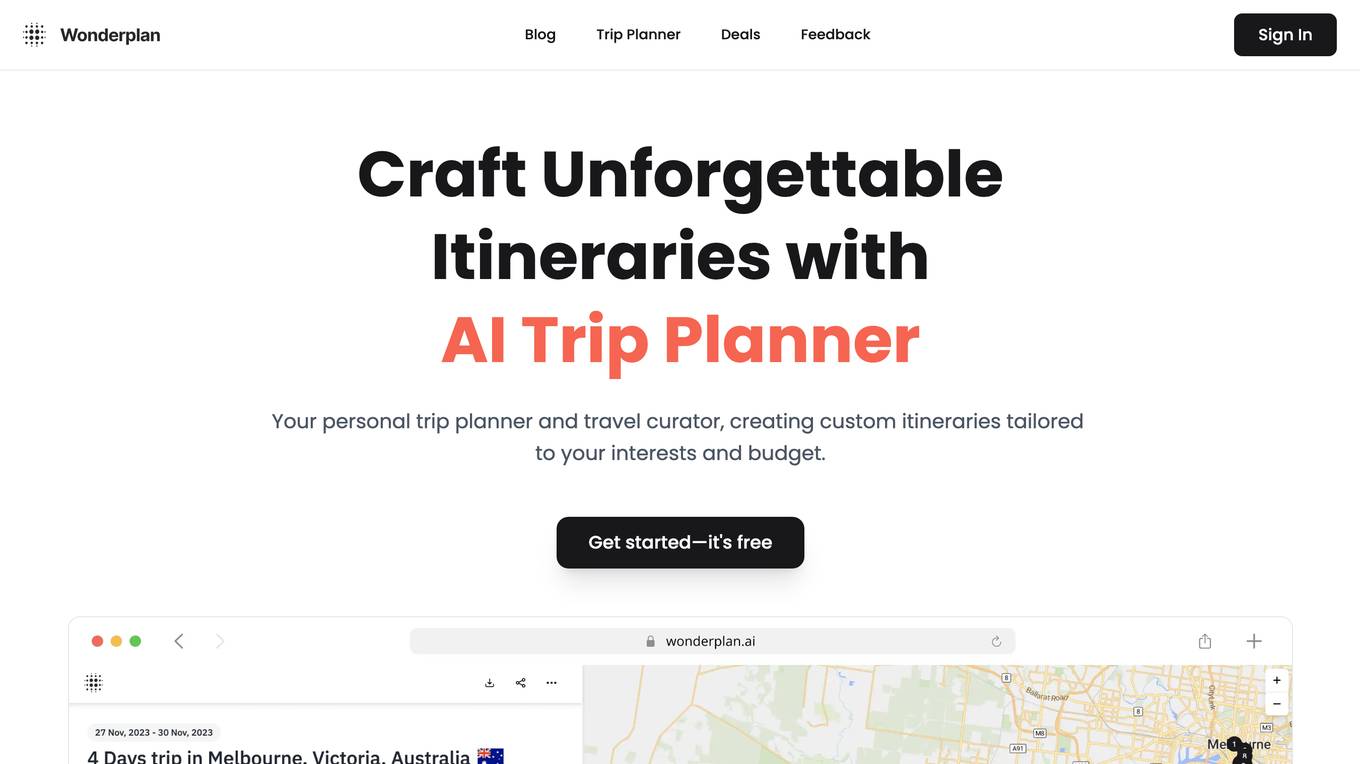
Wonderplan
Wonderplan is an AI-powered trip planning tool that helps users create personalized itineraries based on their preferences and budget. It offers features such as AI-generated accommodation recommendations, offline access, and seamless itinerary management. Wonderplan is free to use and provides a user-friendly interface for effortless trip planning.
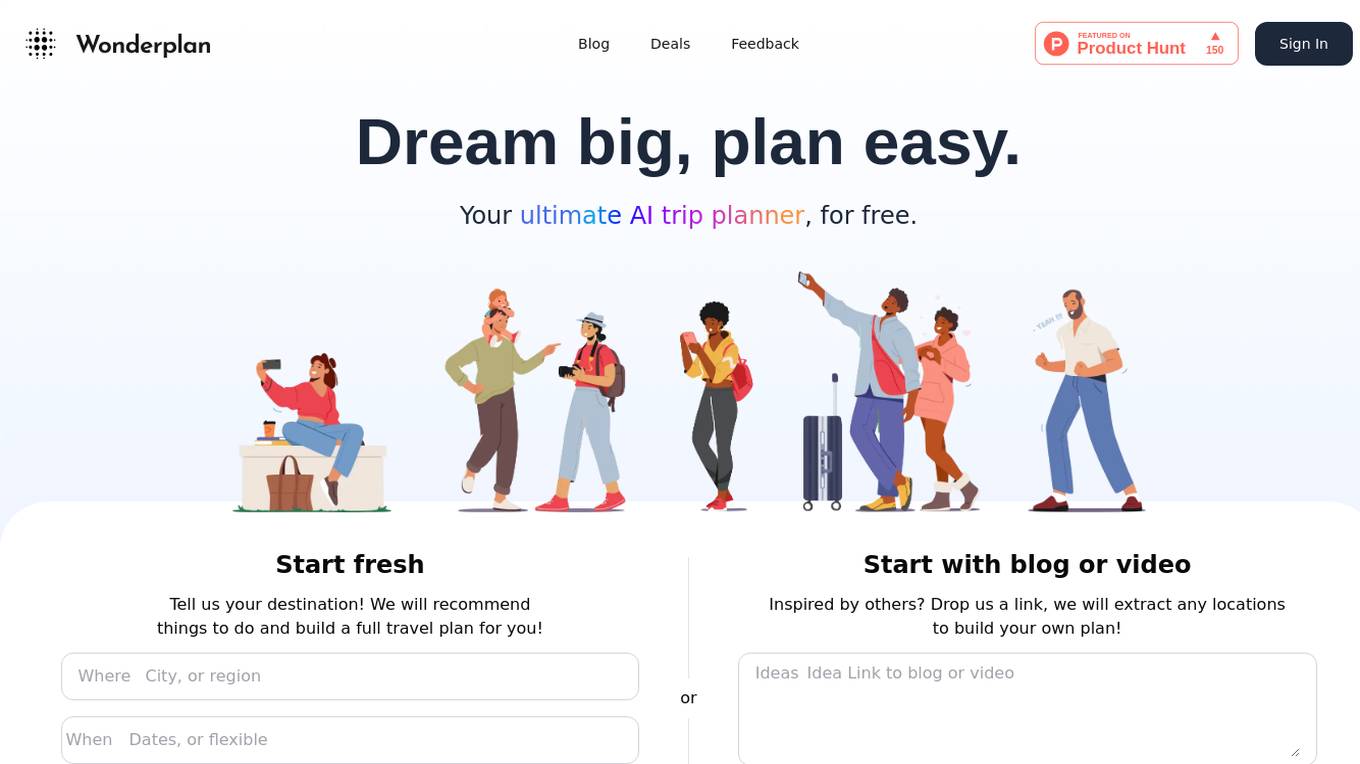
Wonderplan
Wonderplan is the best AI trip planner and travel planner that helps users dream big and plan easy. It offers personalized travel recommendations, itinerary building, and trip planning services. Users can input their destination, dates, and preferences to receive tailored suggestions for activities and locations. Wonderplan utilizes AI technology to extract information from blogs and videos, curate exceptional travel experiences, and summarize global travel wisdom. The platform provides a user-friendly interface for seamless planning, routing, and visualization of travel plans.
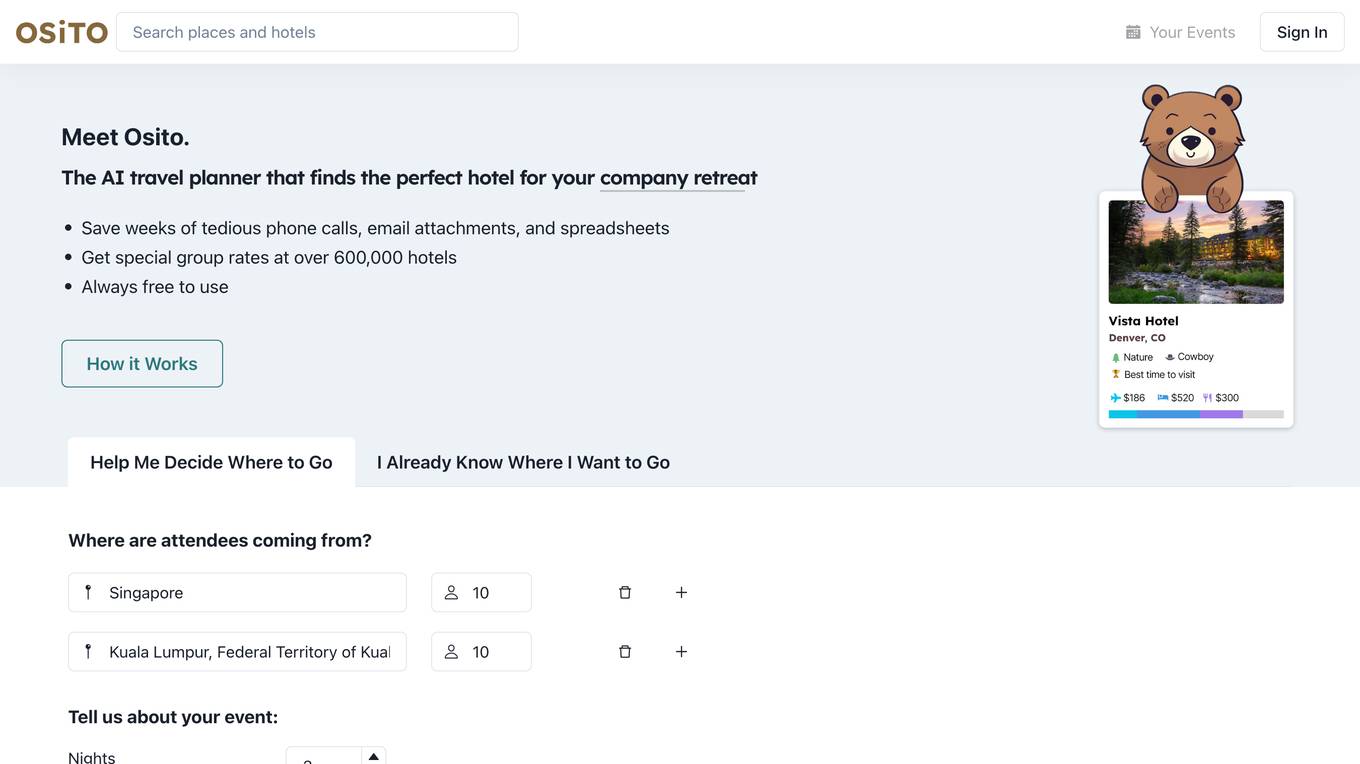
Osito
Osito is an AI-powered travel planner that helps businesses and individuals find the perfect hotel for their group events. It offers a wide range of features to make the planning process easier, including the ability to search for hotels based on specific criteria, compare prices, and book directly with the hotel. Osito also provides personalized recommendations and rewards for users who book through its platform.

TripOffice.com
TripOffice.com is a website that allows users to book hotel rooms with workspaces. The website has over 200,000 hotels and apartments in over 100 countries. TripOffice.com also offers a variety of amenities for digital nomads, including ergonomic chairs, professional desks, and high-speed internet. The website is easy to use and allows users to search for hotels by location, amenities, and price.

Travel AI
This website provides a personalized and detailed trip itinerary for any travel idea or place in the world in seconds using artificial intelligence. It offers a wide range of features to help you plan your perfect trip, including the ability to search for flights, hotels, and activities, as well as get recommendations on what to see and do. The website also provides a variety of travel tips and advice to help you make the most of your trip.
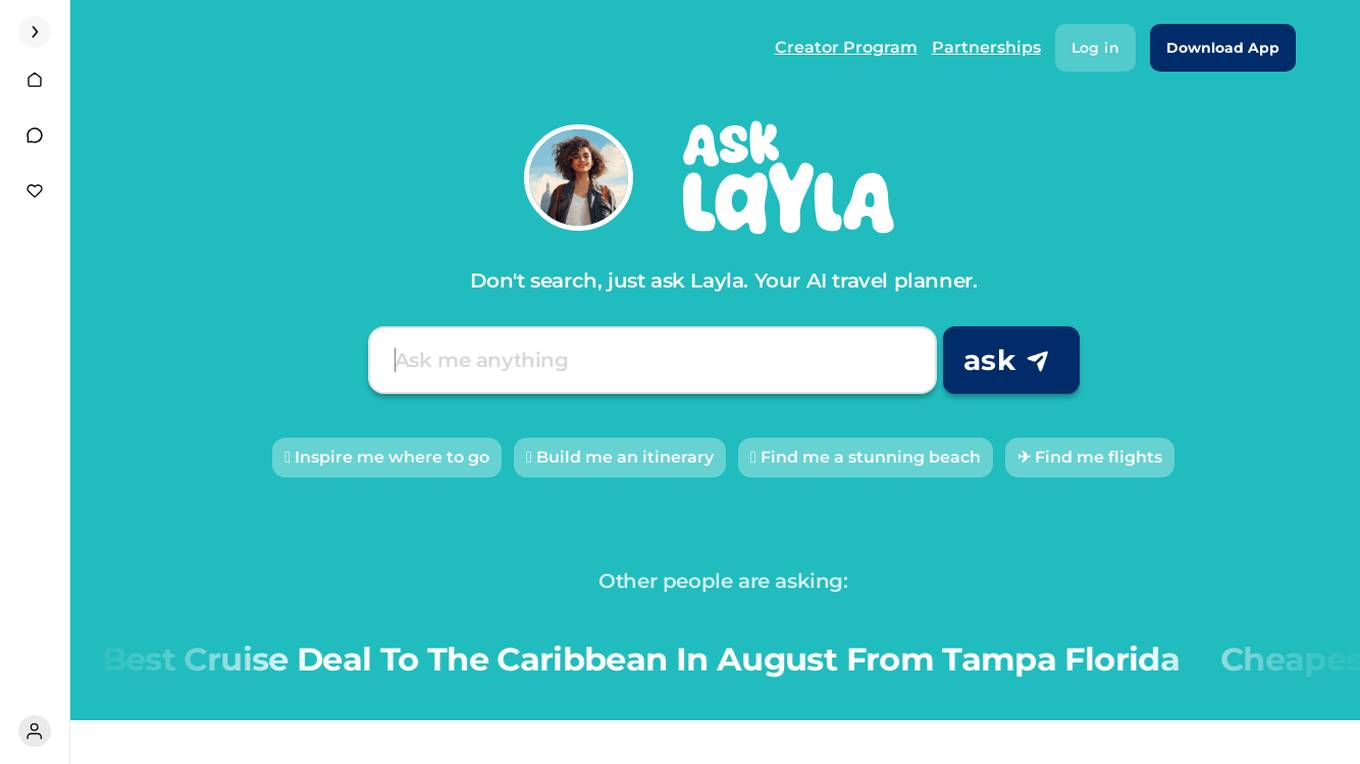
askLAYLA
askLAYLA is a free AI trip planner trusted by millions of users. It simplifies trip planning by providing personalized destination ideas, itinerary creation, and travel recommendations. Users can chat with Layla to get inspiration for travel destinations, find flights, and create customized itineraries. The platform offers a unique experience with inspiring video content from creators, making trip planning efficient and enjoyable.
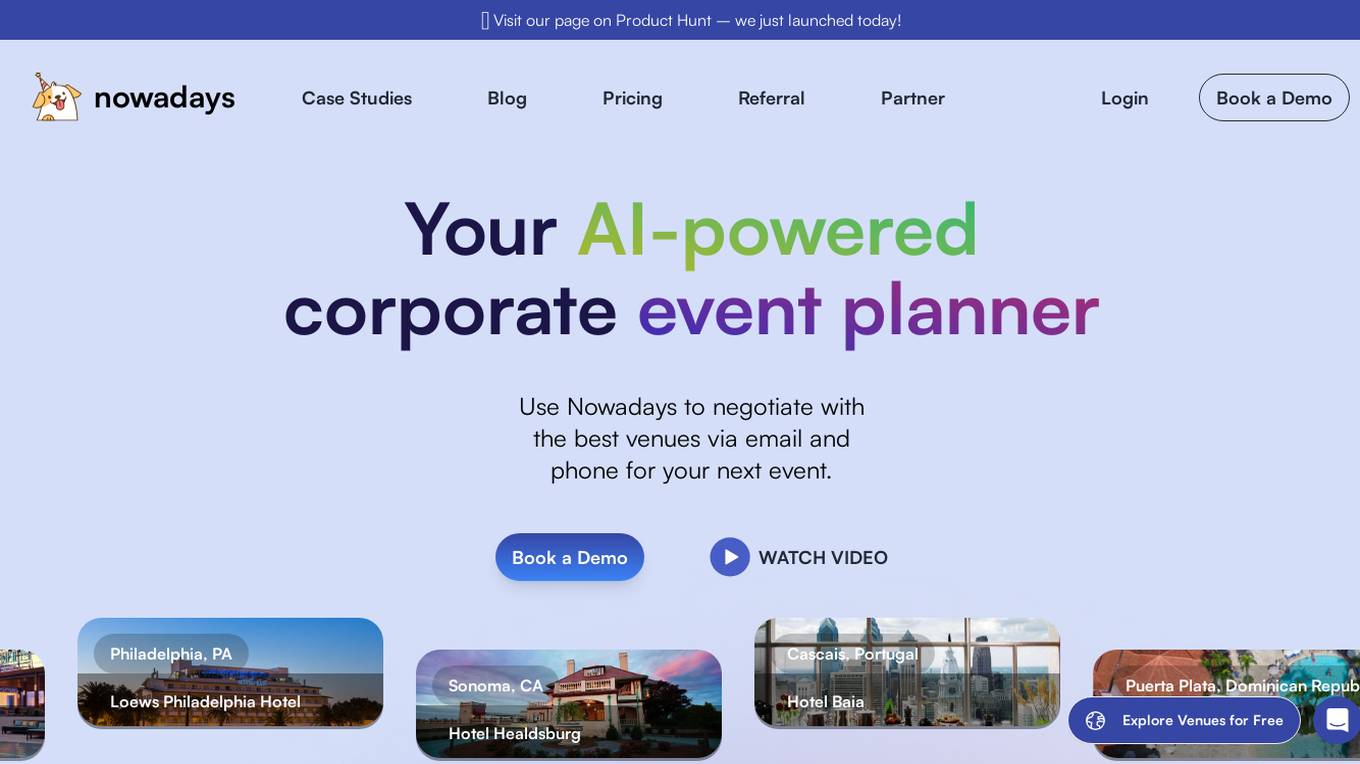
Nowadays
Nowadays is an AI-powered corporate event planner that simplifies event planning by negotiating with the best venues globally via email and phone. It acts as an in-house event planner, considering unique company tastes and needs to secure bids from hotel venues at competitive prices. The platform provides quick response times, operates as an IATA certified AI travel agency, offers unlimited reach for venue search, and saves money through AI negotiations.
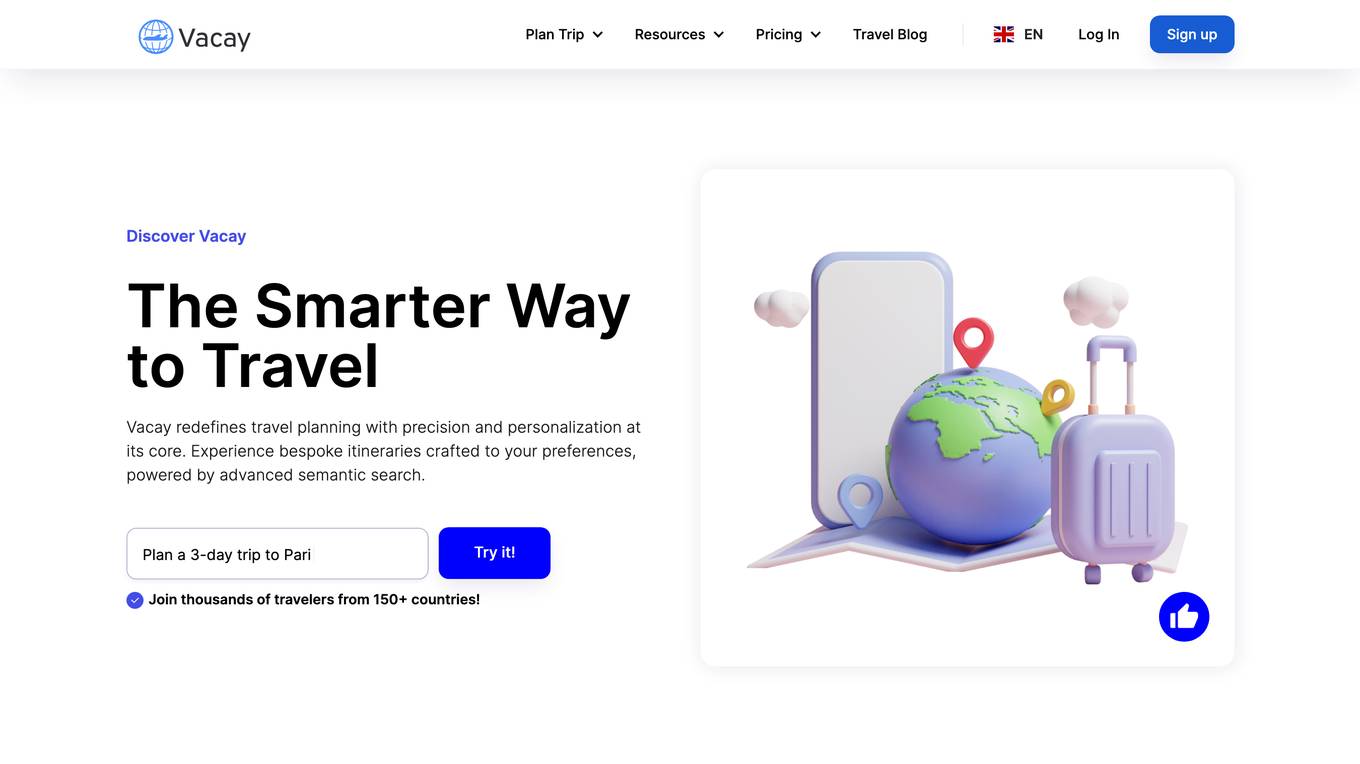
Vacay
Vacay is a travel planning platform that uses artificial intelligence to create personalized itineraries for travelers. The platform offers a variety of features, including a chatbot that can answer questions and provide recommendations, an itinerary planner that can help users create and manage their trips, and a team of thematic advisors who can provide expert advice on specific destinations and travel styles. Vacay is designed to make travel planning easier and more efficient, and it offers a number of advantages over traditional travel search platforms, including the ability to understand and respond to natural language queries, the ability to provide personalized recommendations, and the ability to connect users directly with travel providers.
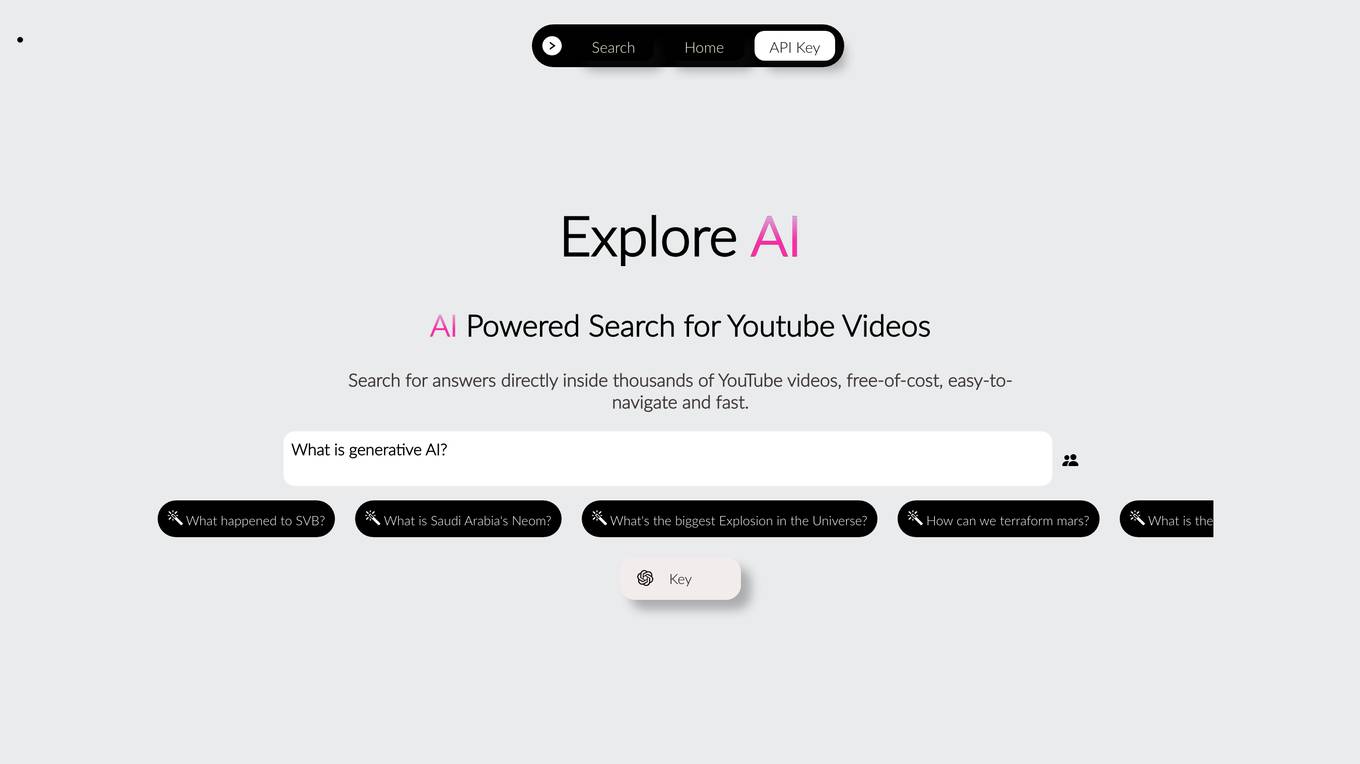
AI Search
AI Powered Search for Youtube Videos. Search for answers directly inside thousands of YouTube videos, free-of-cost, easy-to-navigate and fast.
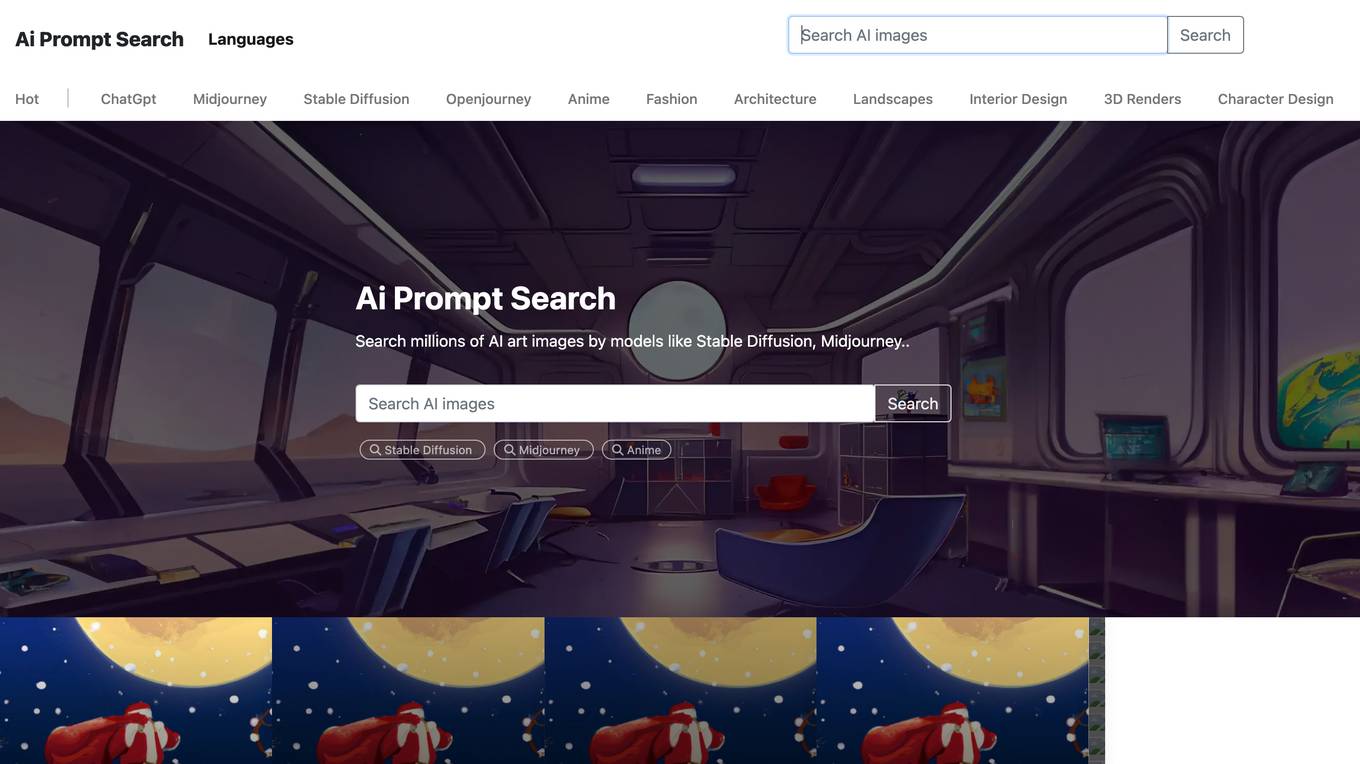
Ai Prompt Search
Ai Prompt Search is a website that provides users with a search engine for AI art prompts. The website includes prompts for various AI art models, including Stable Diffusion, Midjourney, and Openjourney. Users can search for prompts by topic, such as anime, fashion, architecture, landscapes, interior design, 3D renders, and character design. The website also includes a section with frequently asked questions about AI art prompts.
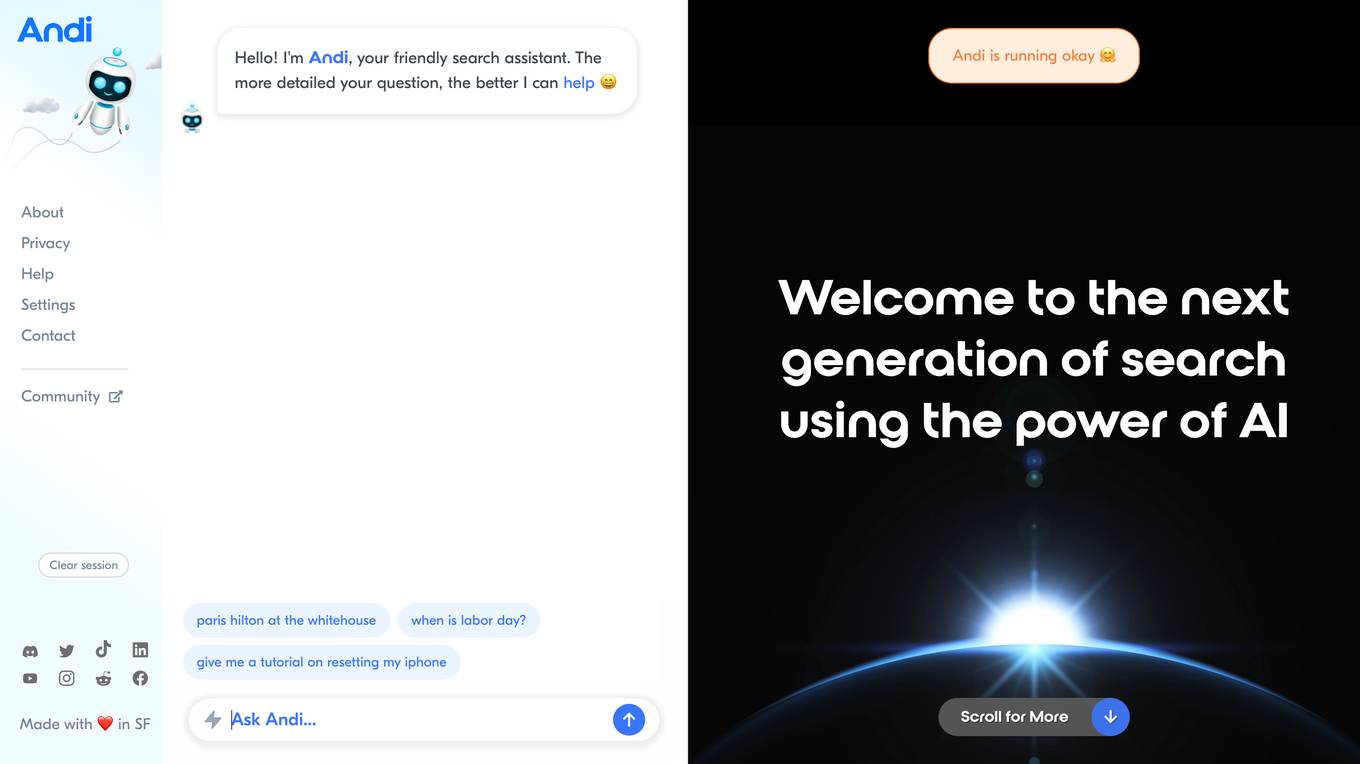
Andi
Andi is a next-generation search engine powered by AI. It provides answers instead of just links, offering a conversational search experience like chatting with a knowledgeable friend. Andi leverages generative AI to deliver comprehensive and human-like responses to user queries.
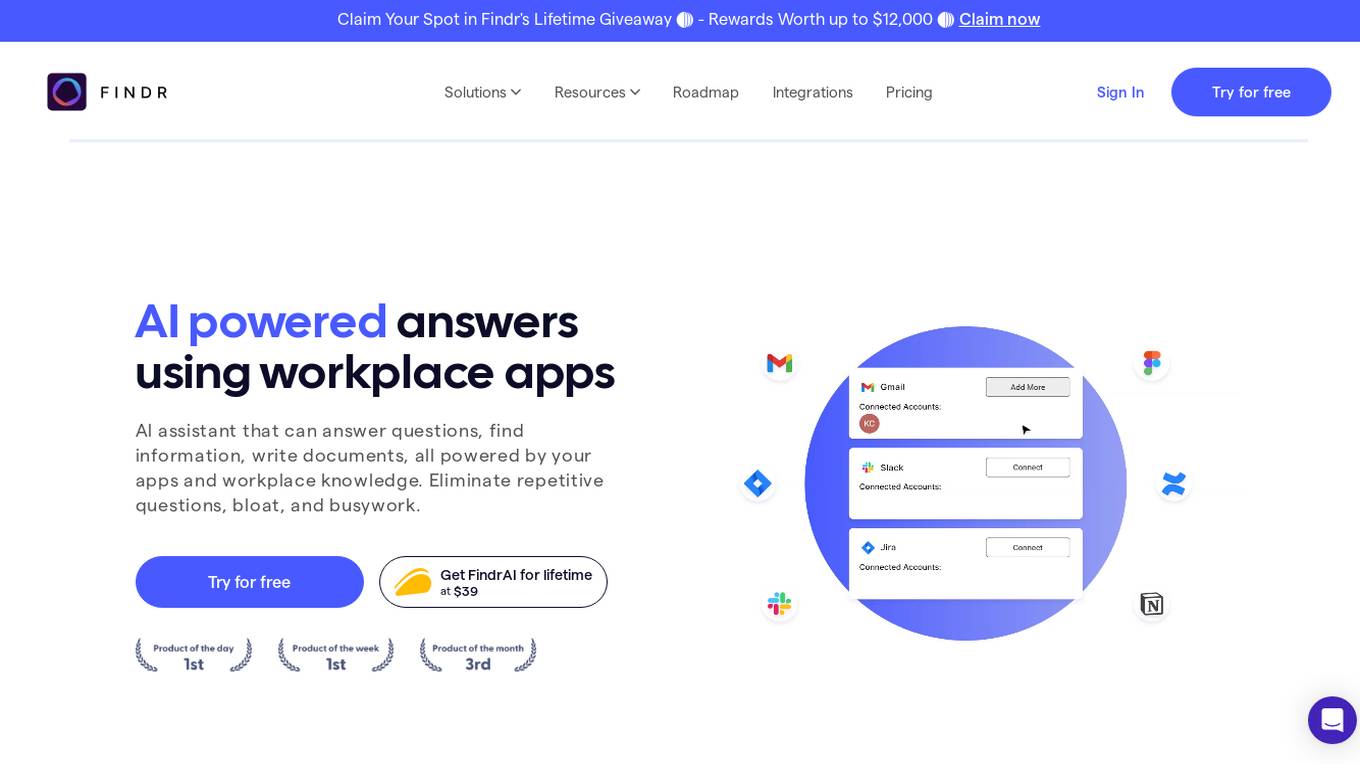
Findr
Findr is an AI-powered search assistant designed for teams to streamline information retrieval and enhance productivity. It offers a centralized platform to search, access, and manage data across various workplace apps. By leveraging AI technology, Findr eliminates repetitive tasks, enhances data search efficiency, and provides instant answers to user queries. With a user-friendly interface and robust security measures, Findr aims to revolutionize the way teams interact with their data and applications.
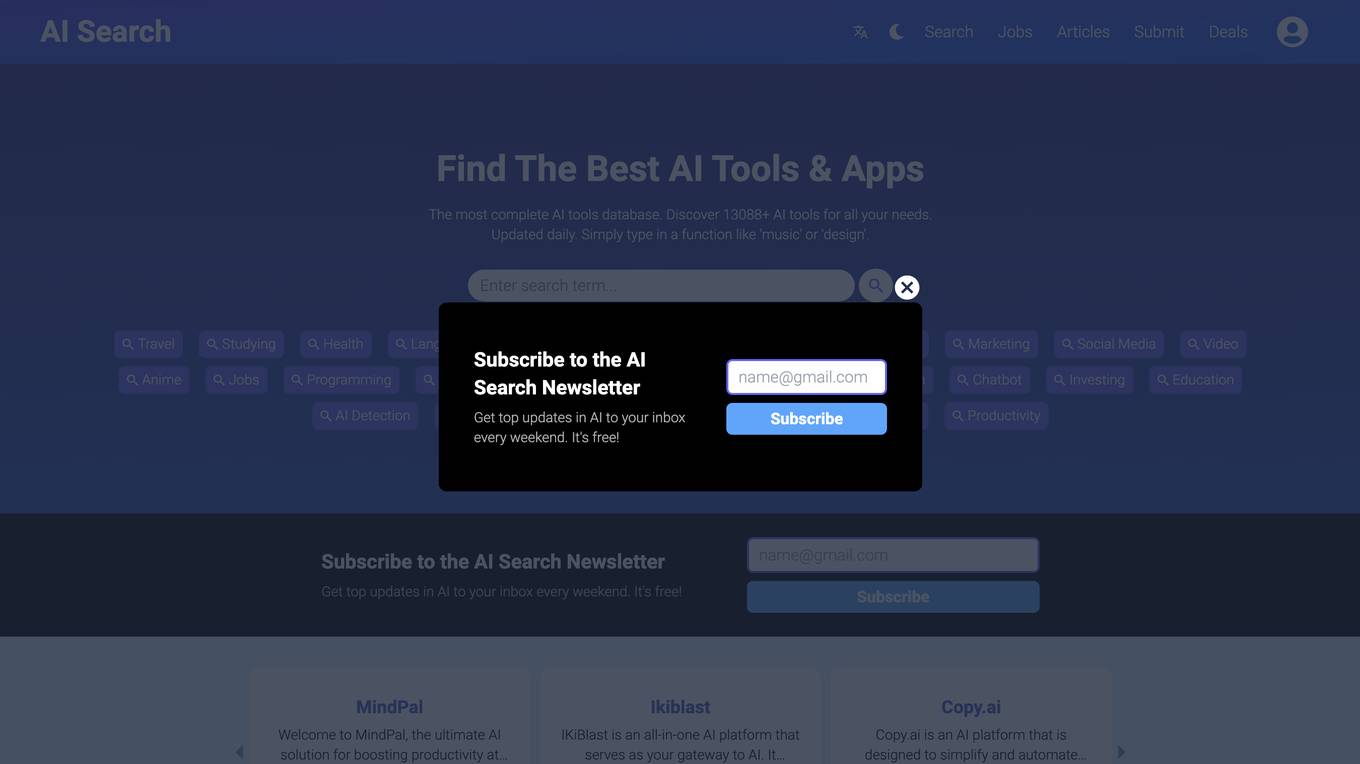
AI Search
AI Search is a comprehensive AI tools database that helps users discover and explore a wide range of AI tools and applications. With over 13000 AI tools listed and updated daily, AI Search provides a valuable resource for individuals and businesses seeking to leverage AI technologies. The platform allows users to search for AI tools based on specific functions or keywords, making it easy to find the right tool for their needs. AI Search also offers a newsletter service that delivers top updates in AI directly to users' inboxes every weekend.
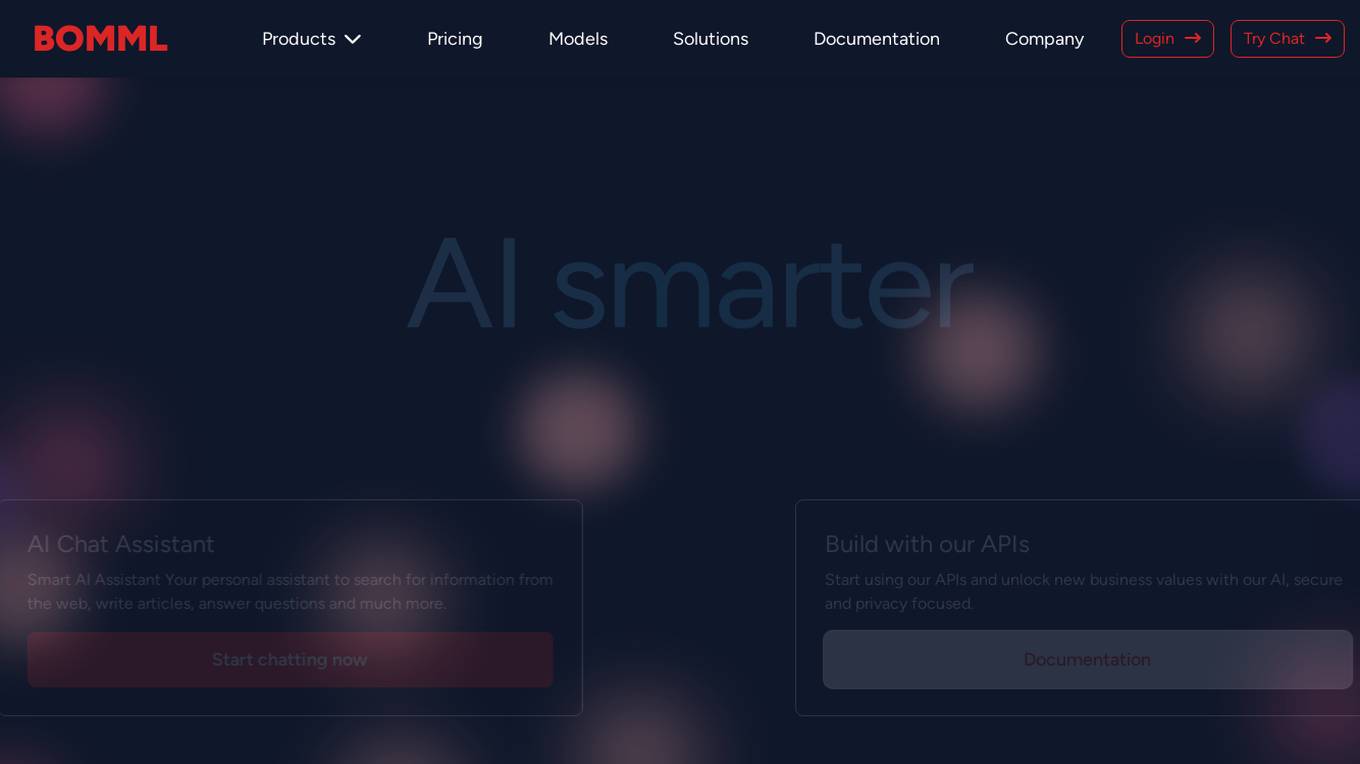
BOMML Smart AI Assistant
BOMML offers a Smart AI Assistant that can be used for a variety of tasks, including searching the web, writing articles, answering questions, and more. The assistant is easy to use and can be integrated into applications via a simple API or web interface. BOMML also offers AI APIs that can be used to add AI capabilities to applications. These APIs are fast, secure, and easy to use. BOMML's AI models are trained on a variety of data and can be used for a variety of tasks, including text generation, conversational chats, embeddings, controlling, analyzing, optical character recognition, and more.
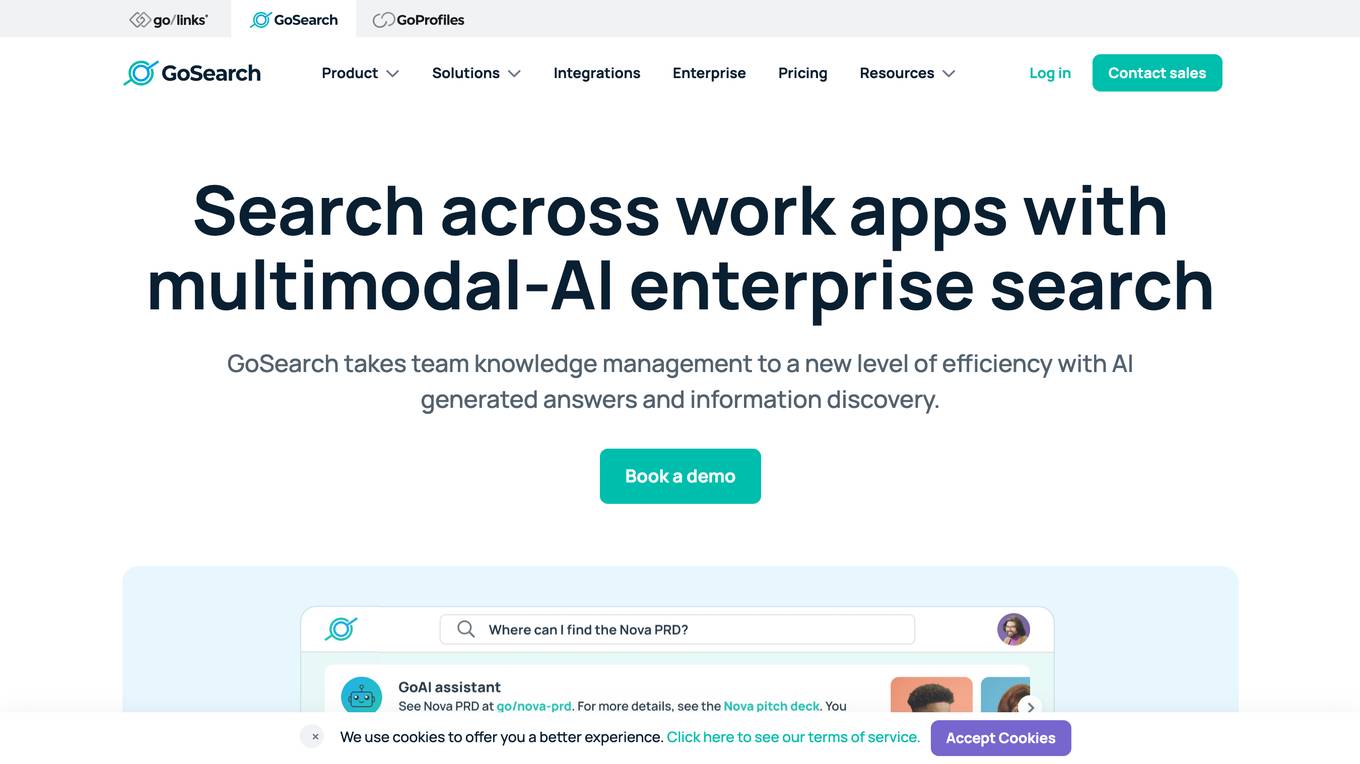
GoSearch
GoSearch is an AI-powered enterprise search and resource discovery tool that helps teams find information quickly and easily. It integrates with over 100 cloud apps and data connectors, and uses multimodal generative AI to provide relevant results and personalized suggestions. GoSearch also includes features such as AI-generated summaries, image search, and custom enterprise GPTs.
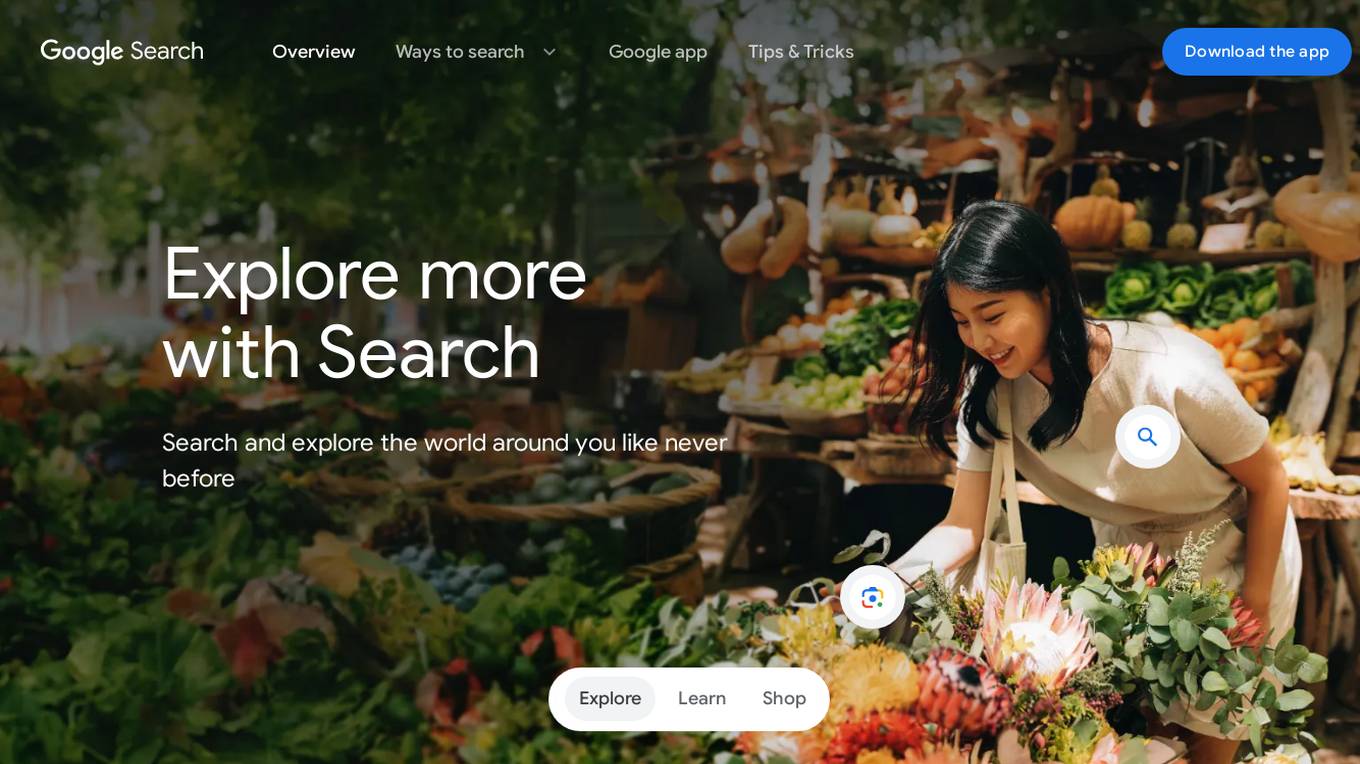
Google Lens
The website is an AI tool called Google Lens that allows users to search, discover, and explore the world around them using AI-powered technology. Users can identify plants, search for information, shop, translate text, find songs, and more by simply using their camera or voice. Google Lens provides detailed overviews, helps with homework, and offers a unique way to interact with the environment through augmented reality. With 25 years of search history, Google Lens continues to innovate and inspire users worldwide.
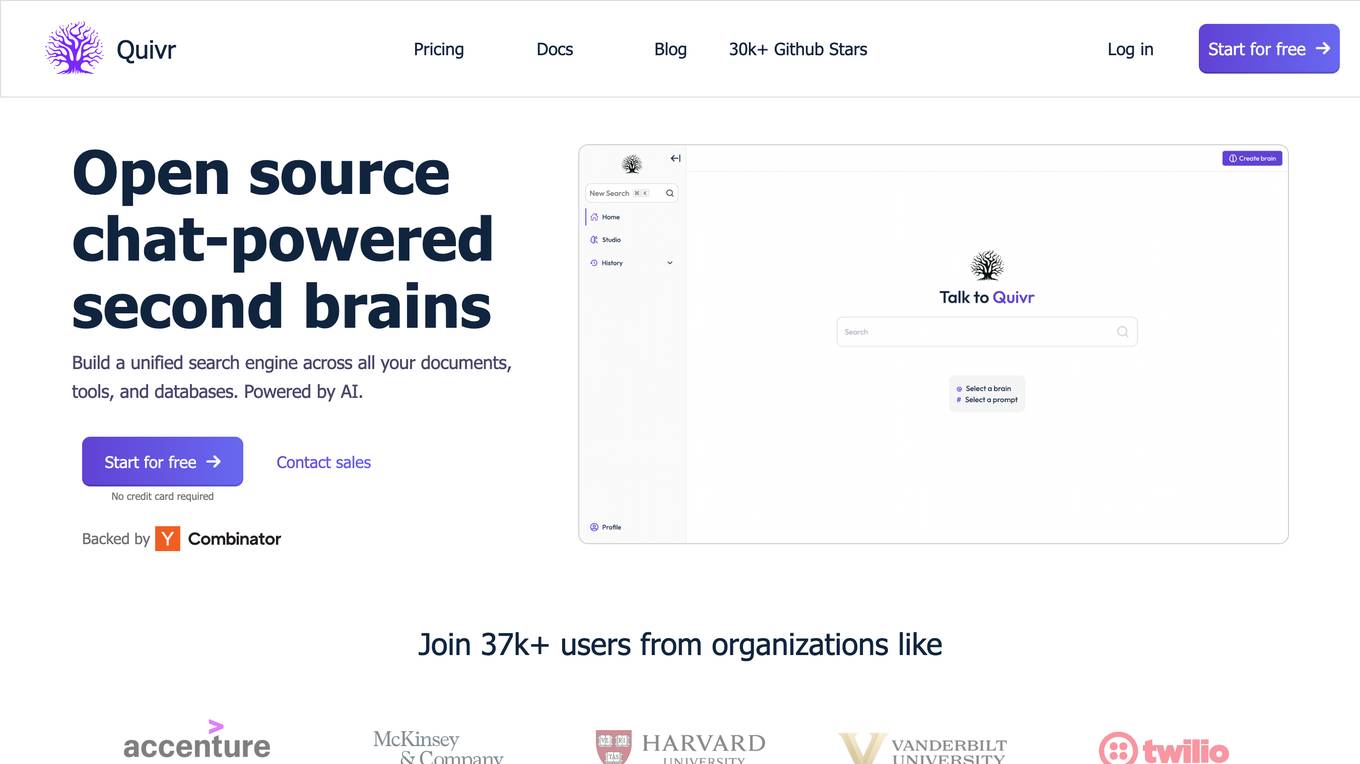
Quivr
Quivr is an open-source, chat-powered second brain that allows users to build a unified search engine across all their documents, tools, and databases. It is powered by AI and continuously trains on the user's company's unique context to improve search relevance and knowledge discovery. Quivr can be integrated with a variety of tools and applications, and users can choose from a variety of GenAI models to get the best results for their specific tasks.

Vectara
Vectara is a conversational search API platform for developers. It features best-in-class retrieval and summarization. The best part is we built in grounded generation which all but eliminates hallucinations.

ModernQuery
ModernQuery is a no-code solution for adding ChatGPT's conversational search to your website. It provides a better search experience for users and allows you to manually adjust search results. ModernQuery also offers autocomplete for your search bar, making it easier for users to find what they're looking for.
20 - Open Source AI Tools
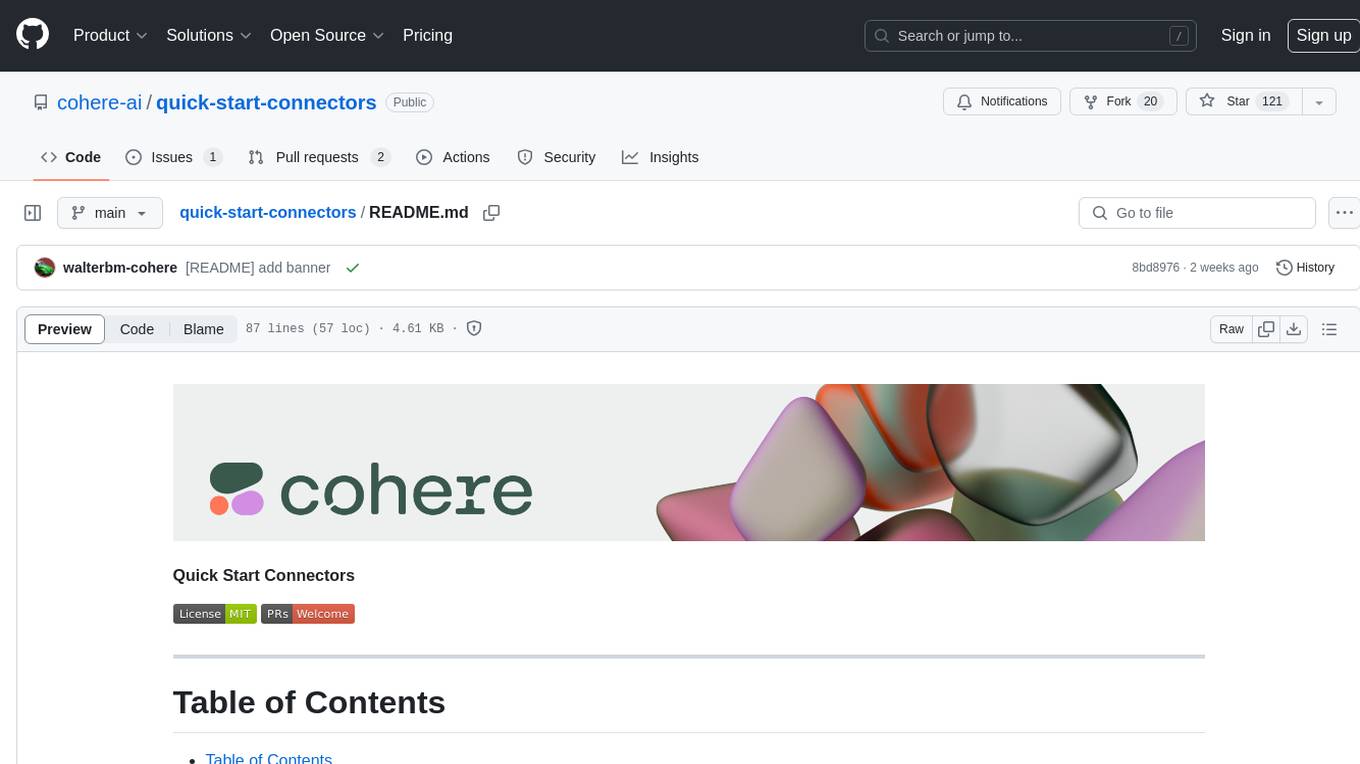
quick-start-connectors
Cohere's Build-Your-Own-Connector framework allows integration of Cohere's Command LLM via the Chat API endpoint to any datastore/software holding text information with a search endpoint. Enables user queries grounded in proprietary information. Use-cases include question/answering, knowledge working, comms summary, and research. Repository provides code for popular datastores and a template connector. Requires Python 3.11+ and Poetry. Connectors can be built and deployed using Docker. Environment variables set authorization values. Pre-commits for linting. Connectors tailored to integrate with Cohere's Chat API for creating chatbots. Connectors return documents as JSON objects for Cohere's API to generate answers with citations.
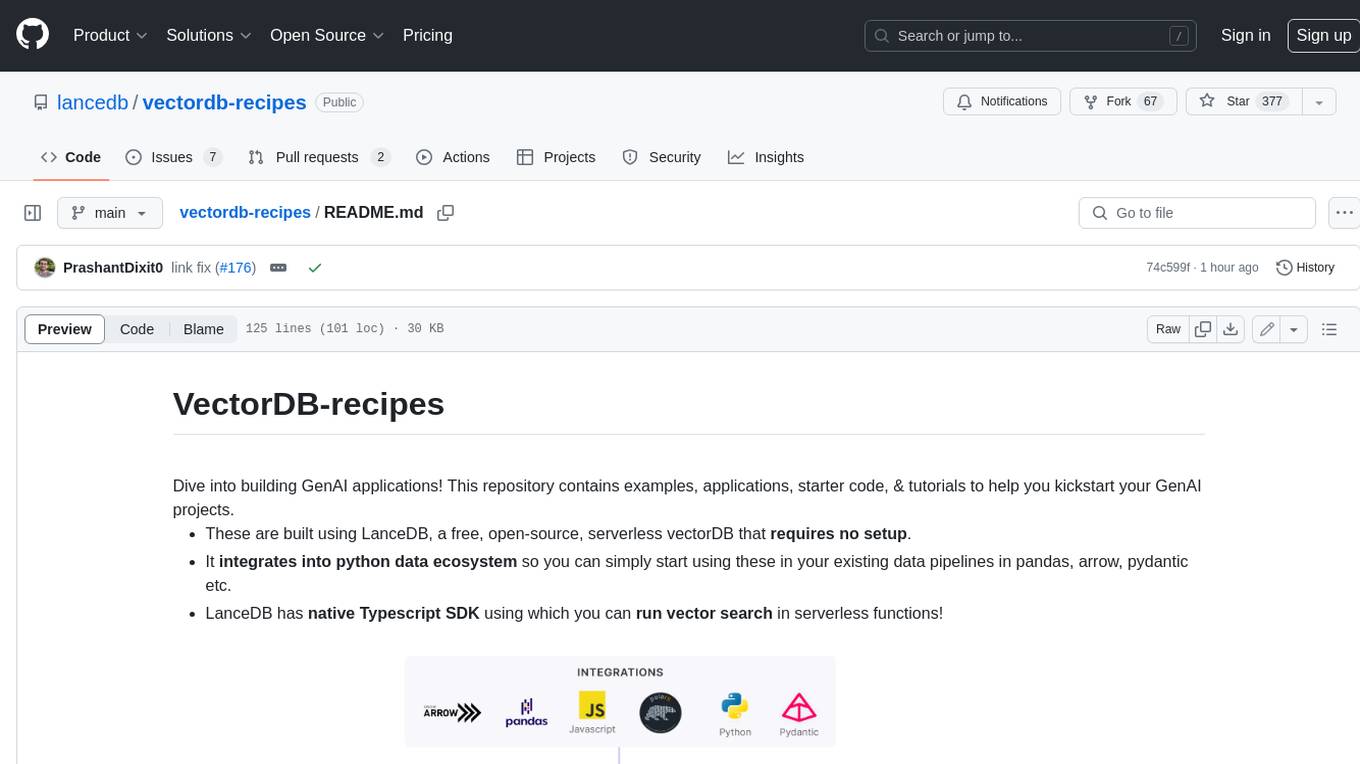
vectordb-recipes
This repository contains examples, applications, starter code, & tutorials to help you kickstart your GenAI projects. * These are built using LanceDB, a free, open-source, serverless vectorDB that **requires no setup**. * It **integrates into python data ecosystem** so you can simply start using these in your existing data pipelines in pandas, arrow, pydantic etc. * LanceDB has **native Typescript SDK** using which you can **run vector search** in serverless functions! This repository is divided into 3 sections: - Examples - Get right into the code with minimal introduction, aimed at getting you from an idea to PoC within minutes! - Applications - Ready to use Python and web apps using applied LLMs, VectorDB and GenAI tools - Tutorials - A curated list of tutorials, blogs, Colabs and courses to get you started with GenAI in greater depth.

serverless-rag-demo
The serverless-rag-demo repository showcases a solution for building a Retrieval Augmented Generation (RAG) system using Amazon Opensearch Serverless Vector DB, Amazon Bedrock, Llama2 LLM, and Falcon LLM. The solution leverages generative AI powered by large language models to generate domain-specific text outputs by incorporating external data sources. Users can augment prompts with relevant context from documents within a knowledge library, enabling the creation of AI applications without managing vector database infrastructure. The repository provides detailed instructions on deploying the RAG-based solution, including prerequisites, architecture, and step-by-step deployment process using AWS Cloudshell.
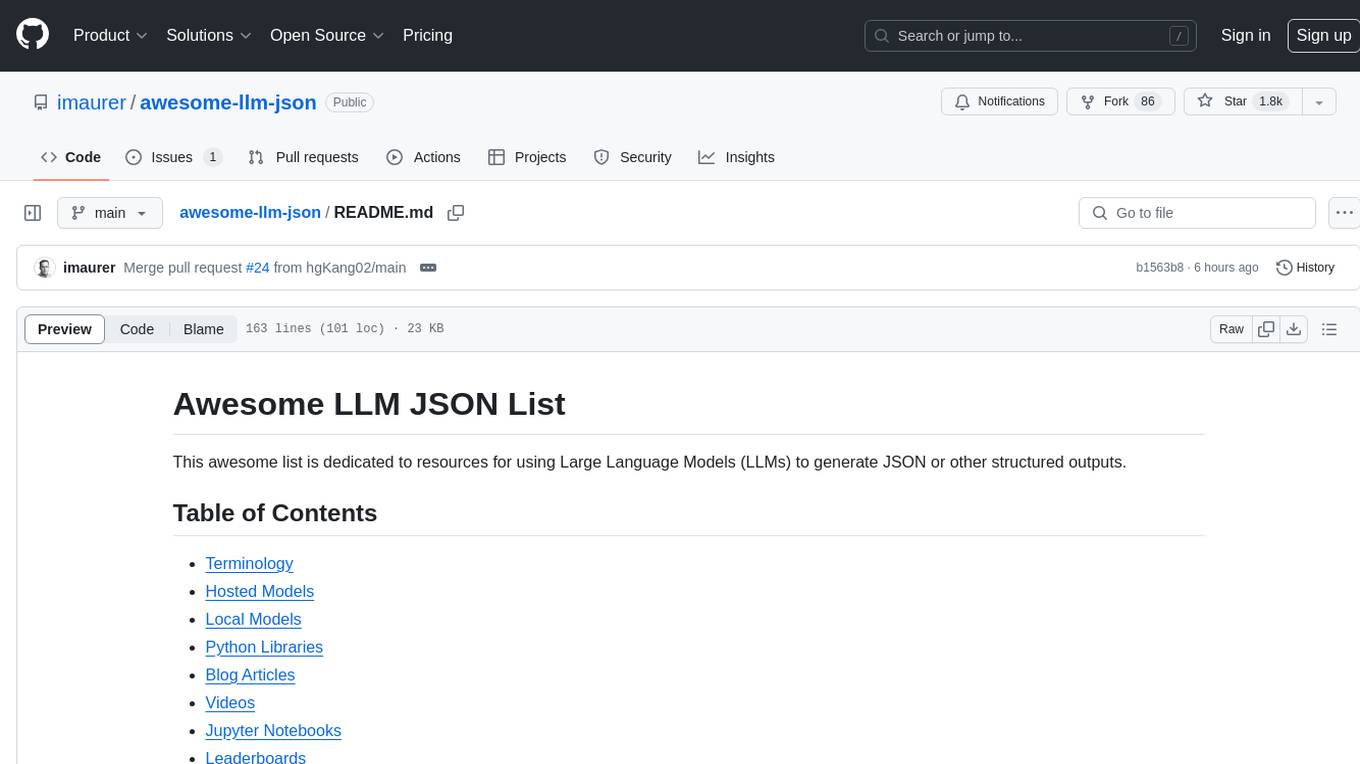
awesome-llm-json
This repository is an awesome list dedicated to resources for using Large Language Models (LLMs) to generate JSON or other structured outputs. It includes terminology explanations, hosted and local models, Python libraries, blog articles, videos, Jupyter notebooks, and leaderboards related to LLMs and JSON generation. The repository covers various aspects such as function calling, JSON mode, guided generation, and tool usage with different providers and models.
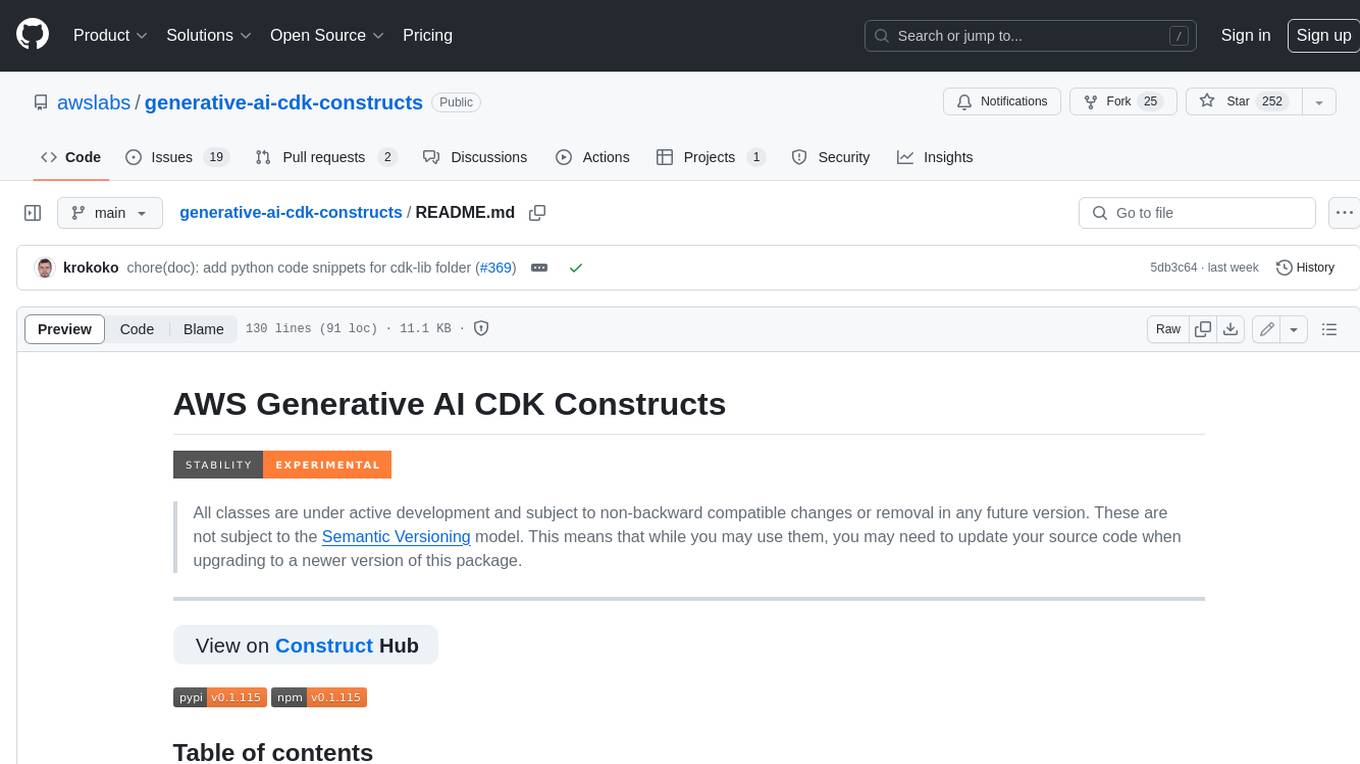
generative-ai-cdk-constructs
The AWS Generative AI Constructs Library is an open-source extension of the AWS Cloud Development Kit (AWS CDK) that provides multi-service, well-architected patterns for quickly defining solutions in code to create predictable and repeatable infrastructure, called constructs. The goal of AWS Generative AI CDK Constructs is to help developers build generative AI solutions using pattern-based definitions for their architecture. The patterns defined in AWS Generative AI CDK Constructs are high level, multi-service abstractions of AWS CDK constructs that have default configurations based on well-architected best practices. The library is organized into logical modules using object-oriented techniques to create each architectural pattern model.
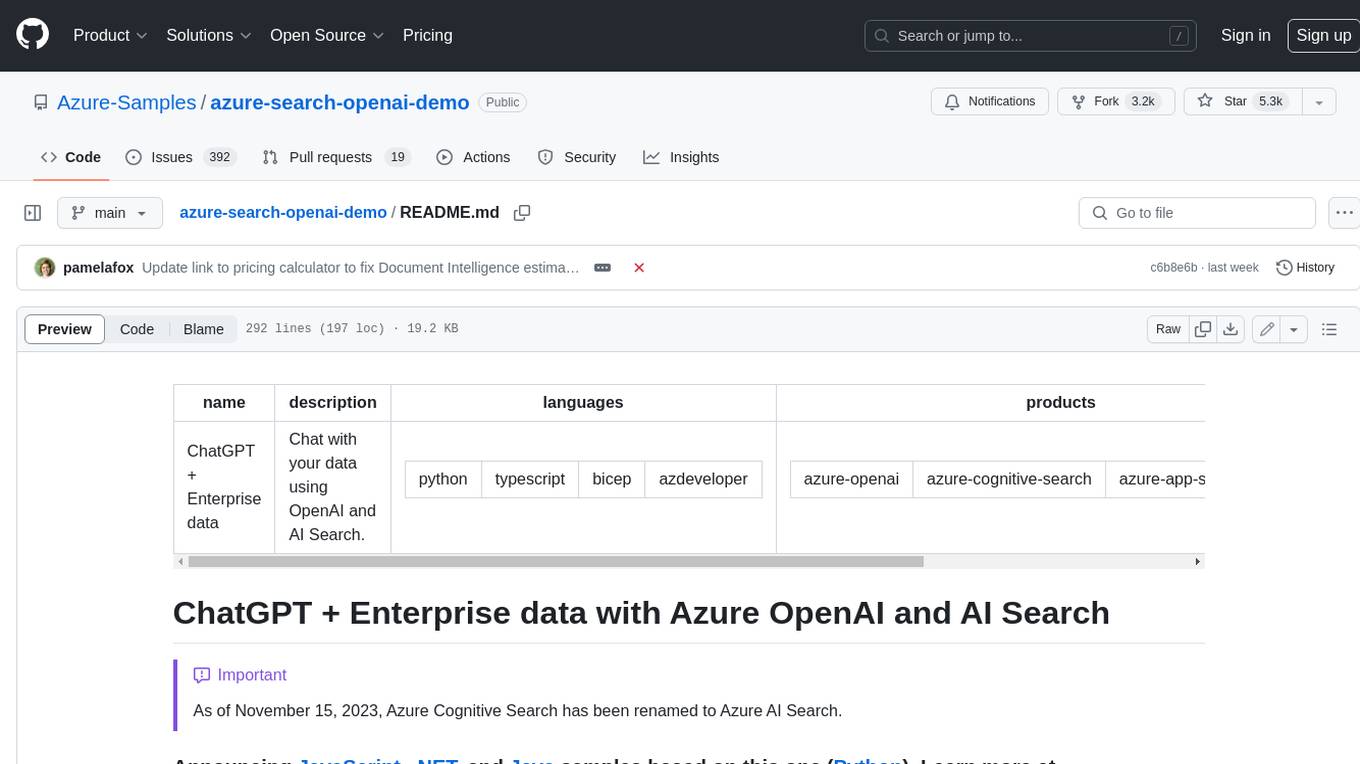
azure-search-openai-demo
This sample demonstrates a few approaches for creating ChatGPT-like experiences over your own data using the Retrieval Augmented Generation pattern. It uses Azure OpenAI Service to access a GPT model (gpt-35-turbo), and Azure AI Search for data indexing and retrieval. The repo includes sample data so it's ready to try end to end. In this sample application we use a fictitious company called Contoso Electronics, and the experience allows its employees to ask questions about the benefits, internal policies, as well as job descriptions and roles.

azure-search-openai-javascript
This sample demonstrates a few approaches for creating ChatGPT-like experiences over your own data using the Retrieval Augmented Generation pattern. It uses Azure OpenAI Service to access the ChatGPT model (gpt-35-turbo), and Azure AI Search for data indexing and retrieval.
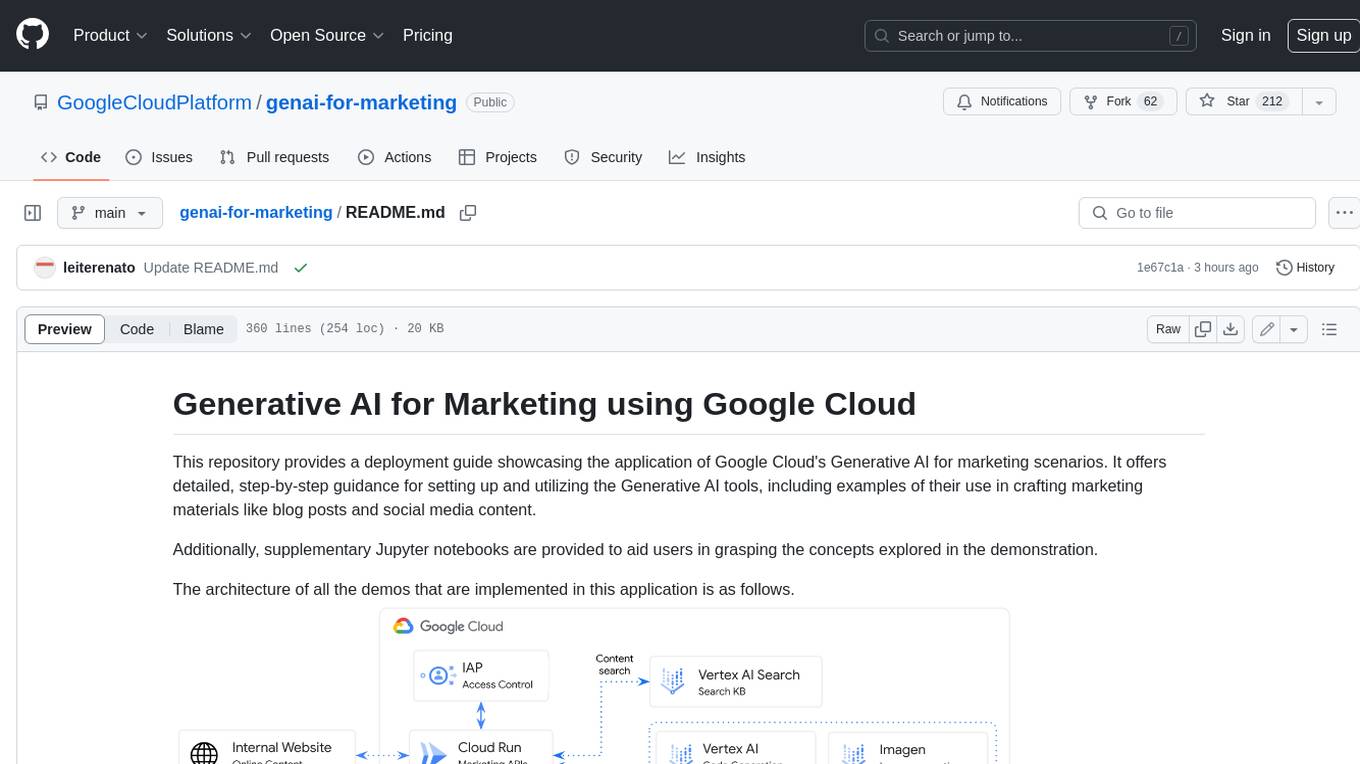
genai-for-marketing
This repository provides a deployment guide for utilizing Google Cloud's Generative AI tools in marketing scenarios. It includes step-by-step instructions, examples of crafting marketing materials, and supplementary Jupyter notebooks. The demos cover marketing insights, audience analysis, trendspotting, content search, content generation, and workspace integration. Users can access and visualize marketing data, analyze trends, improve search experience, and generate compelling content. The repository structure includes backend APIs, frontend code, sample notebooks, templates, and installation scripts.
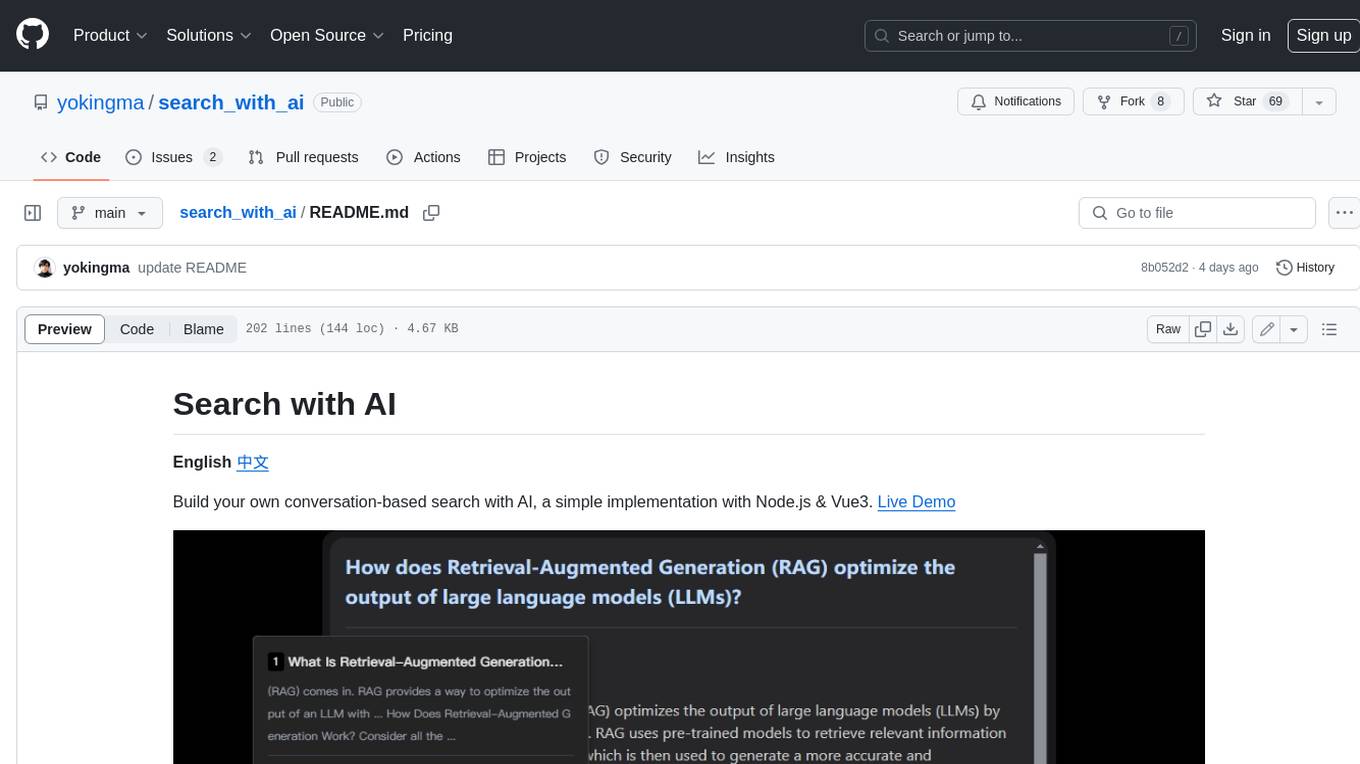
search_with_ai
Build your own conversation-based search with AI, a simple implementation with Node.js & Vue3. Live Demo Features: * Built-in support for LLM: OpenAI, Google, Lepton, Ollama(Free) * Built-in support for search engine: Bing, Sogou, Google, SearXNG(Free) * Customizable pretty UI interface * Support dark mode * Support mobile display * Support local LLM with Ollama * Support i18n * Support Continue Q&A with contexts.
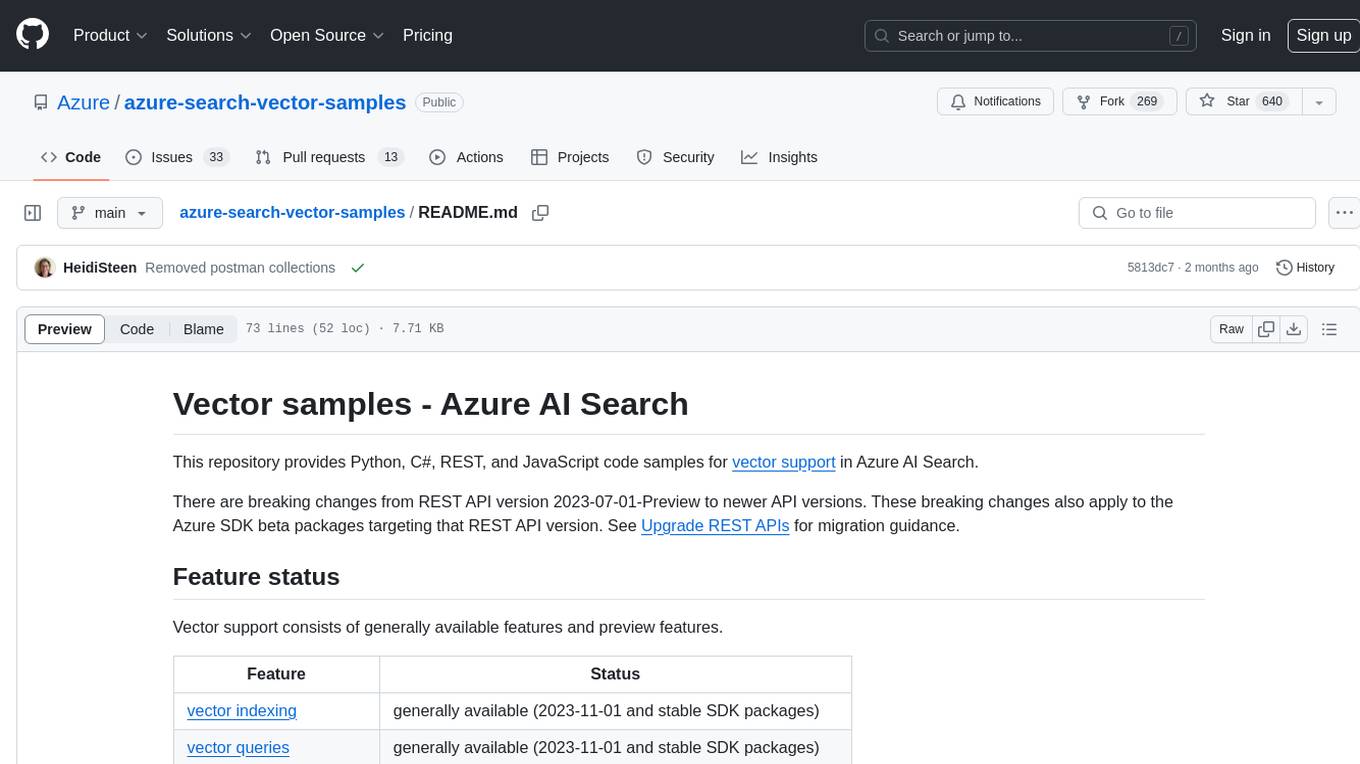
azure-search-vector-samples
This repository provides code samples in Python, C#, REST, and JavaScript for vector support in Azure AI Search. It includes demos for various languages showcasing vectorization of data, creating indexes, and querying vector data. Additionally, it offers tools like Azure AI Search Lab for experimenting with AI-enabled search scenarios in Azure and templates for deploying custom chat-with-your-data solutions. The repository also features documentation on vector search, hybrid search, creating and querying vector indexes, and REST API references for Azure AI Search and Azure OpenAI Service.
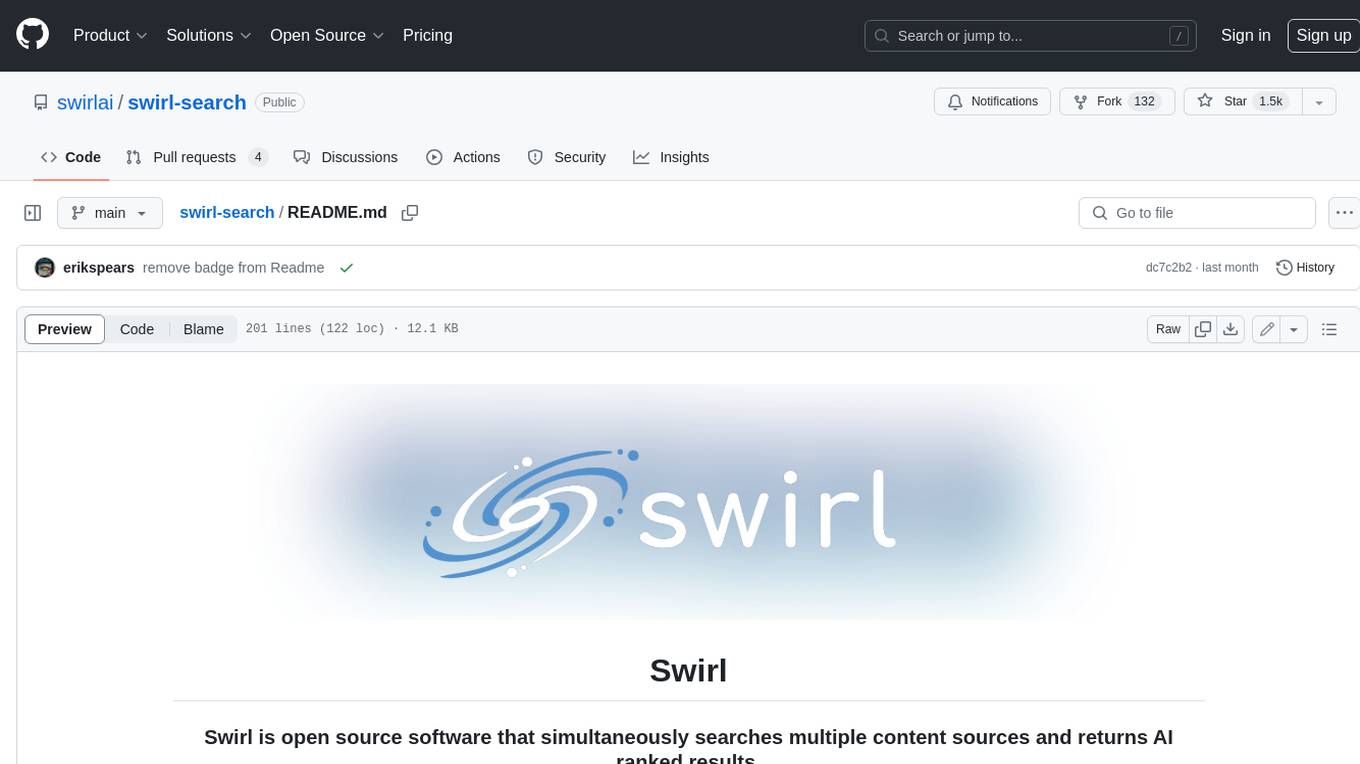
swirl-search
Swirl is an open-source software that allows users to simultaneously search multiple content sources and receive AI-ranked results. It connects to various data sources, including databases, public data services, and enterprise sources, and utilizes AI and LLMs to generate insights and answers based on the user's data. Swirl is easy to use, requiring only the download of a YML file, starting in Docker, and searching with Swirl. Users can add credentials to preloaded SearchProviders to access more sources. Swirl also offers integration with ChatGPT as a configured AI model. It adapts and distributes user queries to anything with a search API, re-ranking the unified results using Large Language Models without extracting or indexing anything. Swirl includes five Google Programmable Search Engines (PSEs) to get users up and running quickly. Key features of Swirl include Microsoft 365 integration, SearchProvider configurations, query adaptation, synchronous or asynchronous search federation, optional subscribe feature, pipelining of Processor stages, results stored in SQLite3 or PostgreSQL, built-in Query Transformation support, matching on word stems and handling of stopwords, duplicate detection, re-ranking of unified results using Cosine Vector Similarity, result mixers, page through all results requested, sample data sets, optional spell correction, optional search/result expiration service, easily extensible Connector and Mixer objects, and a welcoming community for collaboration and support.
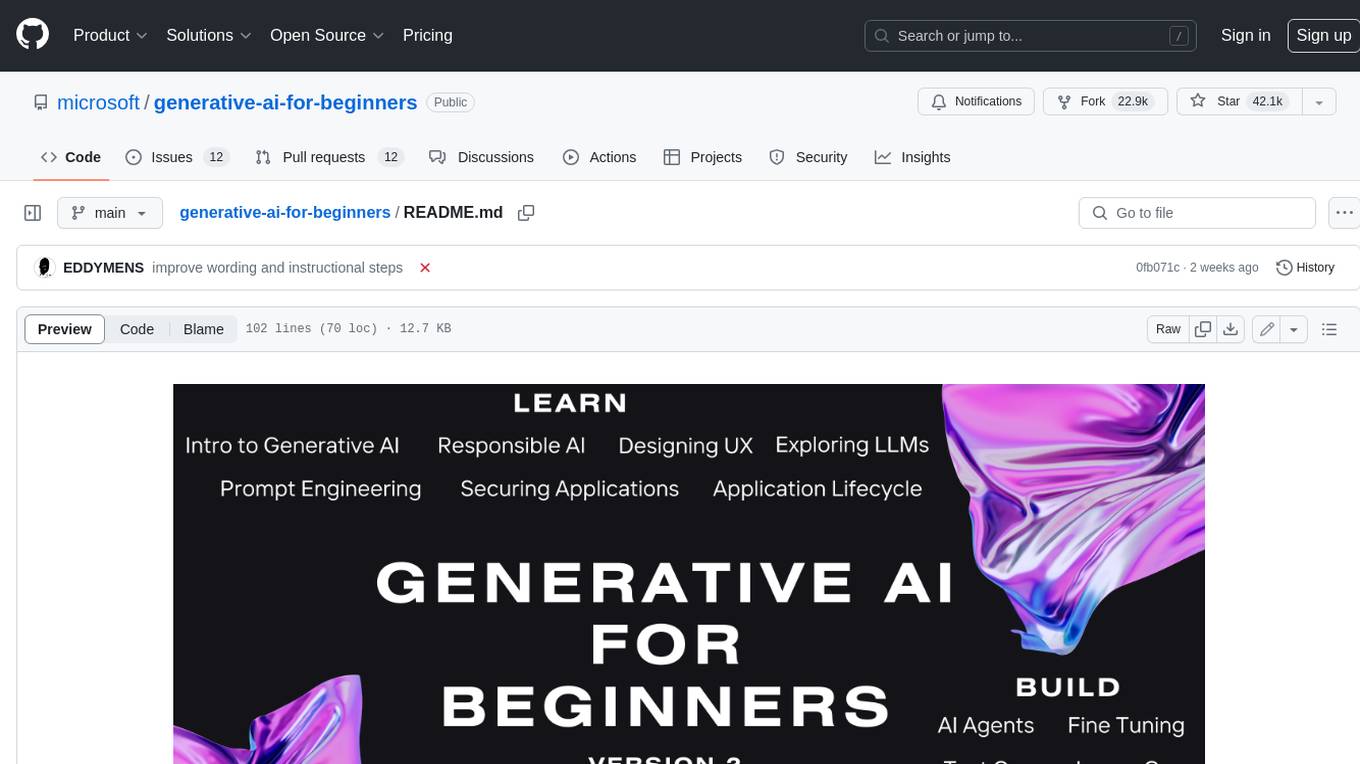
generative-ai-for-beginners
This course has 18 lessons. Each lesson covers its own topic so start wherever you like! Lessons are labeled either "Learn" lessons explaining a Generative AI concept or "Build" lessons that explain a concept and code examples in both **Python** and **TypeScript** when possible. Each lesson also includes a "Keep Learning" section with additional learning tools. **What You Need** * Access to the Azure OpenAI Service **OR** OpenAI API - _Only required to complete coding lessons_ * Basic knowledge of Python or Typescript is helpful - *For absolute beginners check out these Python and TypeScript courses. * A Github account to fork this entire repo to your own GitHub account We have created a **Course Setup** lesson to help you with setting up your development environment. Don't forget to star (🌟) this repo to find it easier later. ## 🧠 Ready to Deploy? If you are looking for more advanced code samples, check out our collection of Generative AI Code Samples in both **Python** and **TypeScript**. ## 🗣️ Meet Other Learners, Get Support Join our official AI Discord server to meet and network with other learners taking this course and get support. ## 🚀 Building a Startup? Sign up for Microsoft for Startups Founders Hub to receive **free OpenAI credits** and up to **$150k towards Azure credits to access OpenAI models through Azure OpenAI Services**. ## 🙏 Want to help? Do you have suggestions or found spelling or code errors? Raise an issue or Create a pull request ## 📂 Each lesson includes: * A short video introduction to the topic * A written lesson located in the README * Python and TypeScript code samples supporting Azure OpenAI and OpenAI API * Links to extra resources to continue your learning ## 🗃️ Lessons | | Lesson Link | Description | Additional Learning | | :-: | :------------------------------------------------------------------------------------------------------------------------------------------: | :---------------------------------------------------------------------------------------------: | ------------------------------------------------------------------------------ | | 00 | Course Setup | **Learn:** How to Setup Your Development Environment | Learn More | | 01 | Introduction to Generative AI and LLMs | **Learn:** Understanding what Generative AI is and how Large Language Models (LLMs) work. | Learn More | | 02 | Exploring and comparing different LLMs | **Learn:** How to select the right model for your use case | Learn More | | 03 | Using Generative AI Responsibly | **Learn:** How to build Generative AI Applications responsibly | Learn More | | 04 | Understanding Prompt Engineering Fundamentals | **Learn:** Hands-on Prompt Engineering Best Practices | Learn More | | 05 | Creating Advanced Prompts | **Learn:** How to apply prompt engineering techniques that improve the outcome of your prompts. | Learn More | | 06 | Building Text Generation Applications | **Build:** A text generation app using Azure OpenAI | Learn More | | 07 | Building Chat Applications | **Build:** Techniques for efficiently building and integrating chat applications. | Learn More | | 08 | Building Search Apps Vector Databases | **Build:** A search application that uses Embeddings to search for data. | Learn More | | 09 | Building Image Generation Applications | **Build:** A image generation application | Learn More | | 10 | Building Low Code AI Applications | **Build:** A Generative AI application using Low Code tools | Learn More | | 11 | Integrating External Applications with Function Calling | **Build:** What is function calling and its use cases for applications | Learn More | | 12 | Designing UX for AI Applications | **Learn:** How to apply UX design principles when developing Generative AI Applications | Learn More | | 13 | Securing Your Generative AI Applications | **Learn:** The threats and risks to AI systems and methods to secure these systems. | Learn More | | 14 | The Generative AI Application Lifecycle | **Learn:** The tools and metrics to manage the LLM Lifecycle and LLMOps | Learn More | | 15 | Retrieval Augmented Generation (RAG) and Vector Databases | **Build:** An application using a RAG Framework to retrieve embeddings from a Vector Databases | Learn More | | 16 | Open Source Models and Hugging Face | **Build:** An application using open source models available on Hugging Face | Learn More | | 17 | AI Agents | **Build:** An application using an AI Agent Framework | Learn More | | 18 | Fine-Tuning LLMs | **Learn:** The what, why and how of fine-tuning LLMs | Learn More |

qdrant
Qdrant is a vector similarity search engine and vector database. It is written in Rust, which makes it fast and reliable even under high load. Qdrant can be used for a variety of applications, including: * Semantic search * Image search * Product recommendations * Chatbots * Anomaly detection Qdrant offers a variety of features, including: * Payload storage and filtering * Hybrid search with sparse vectors * Vector quantization and on-disk storage * Distributed deployment * Highlighted features such as query planning, payload indexes, SIMD hardware acceleration, async I/O, and write-ahead logging Qdrant is available as a fully managed cloud service or as an open-source software that can be deployed on-premises.
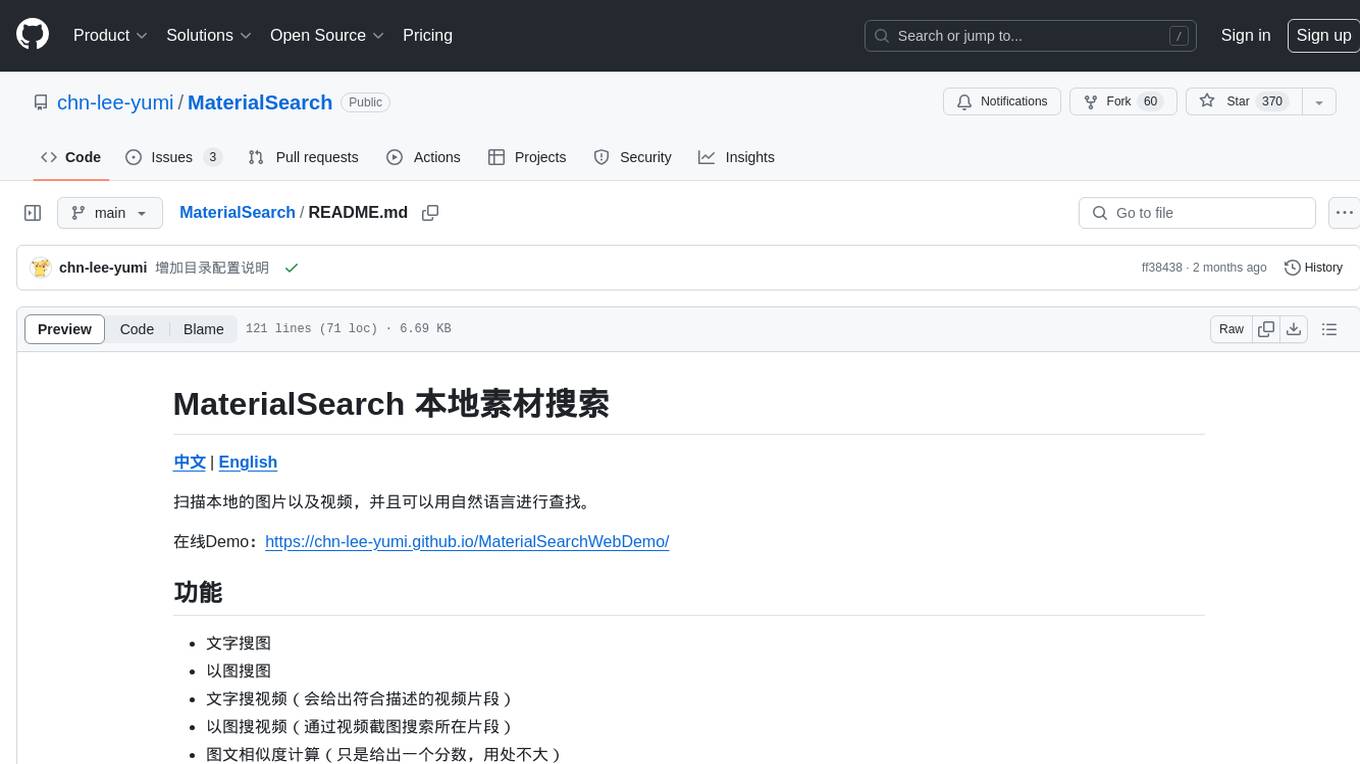
MaterialSearch
MaterialSearch is a tool for searching local images and videos using natural language. It provides functionalities such as text search for images, image search for images, text search for videos (providing matching video clips), image search for videos (searching for the segment in a video through a screenshot), image-text similarity calculation, and Pexels video search. The tool can be deployed through the source code or Docker image, and it supports GPU acceleration. Users can configure the tool through environment variables or a .env file. The tool is still under development, and configurations may change frequently. Users can report issues or suggest improvements through issues or pull requests.
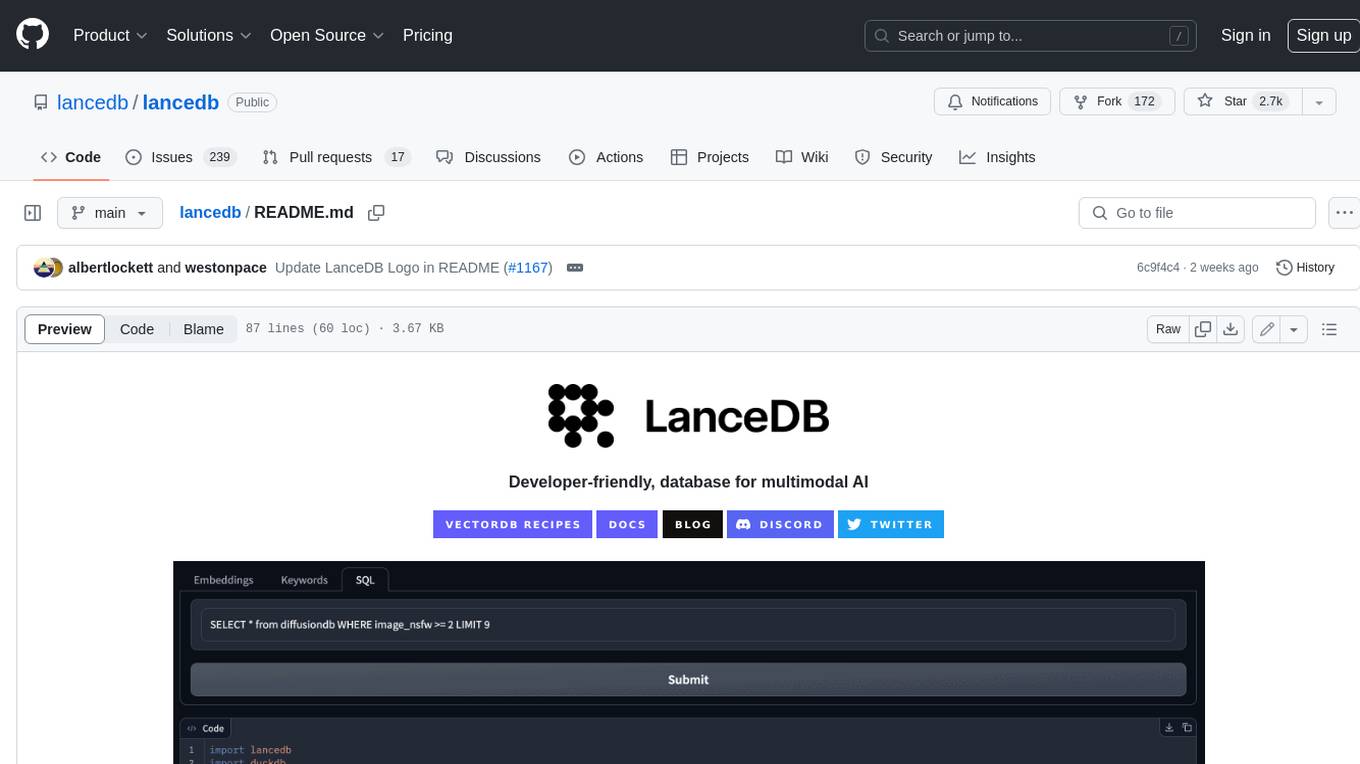
lancedb
LanceDB is an open-source database for vector-search built with persistent storage, which greatly simplifies retrieval, filtering, and management of embeddings. The key features of LanceDB include: Production-scale vector search with no servers to manage. Store, query, and filter vectors, metadata, and multi-modal data (text, images, videos, point clouds, and more). Support for vector similarity search, full-text search, and SQL. Native Python and Javascript/Typescript support. Zero-copy, automatic versioning, manage versions of your data without needing extra infrastructure. GPU support in building vector index(*). Ecosystem integrations with LangChain 🦜️🔗, LlamaIndex 🦙, Apache-Arrow, Pandas, Polars, DuckDB, and more on the way. LanceDB's core is written in Rust 🦀 and is built using Lance, an open-source columnar format designed for performant ML workloads.
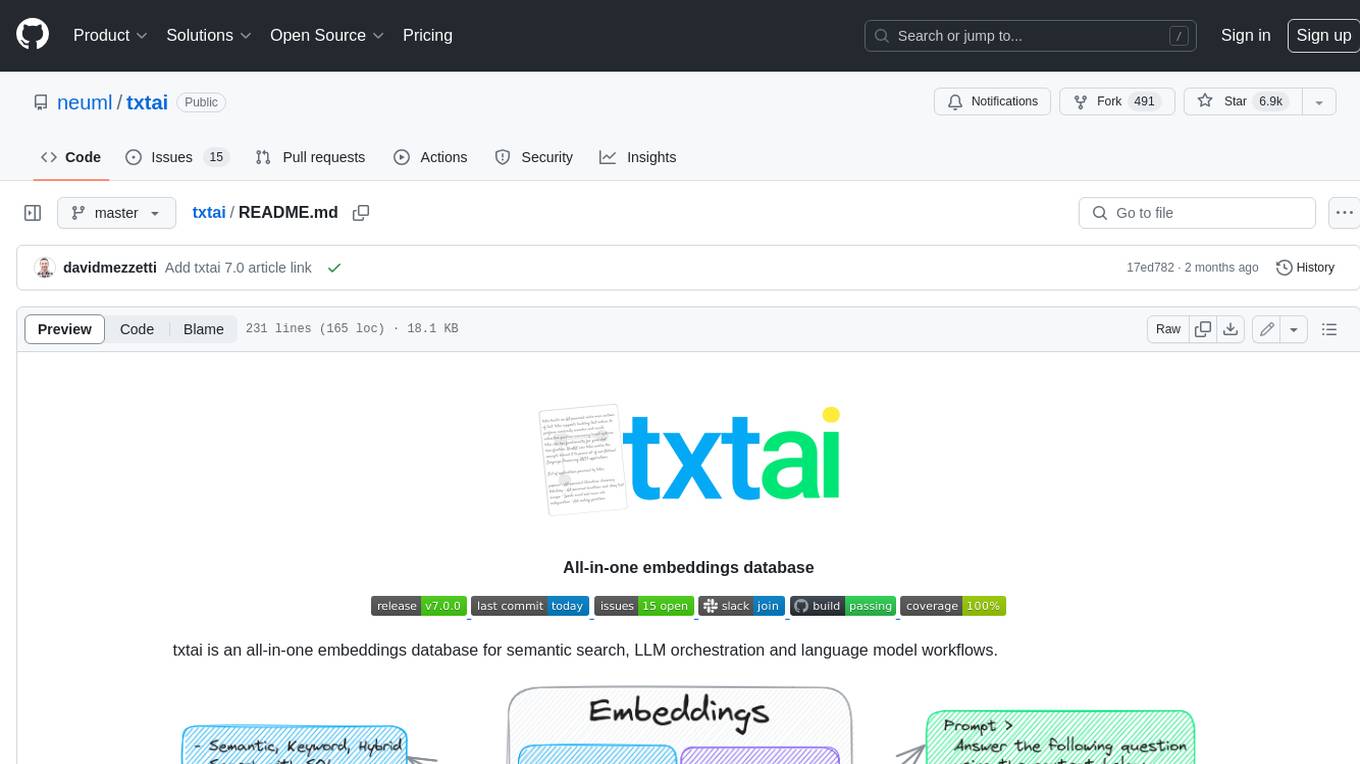
txtai
Txtai is an all-in-one embeddings database for semantic search, LLM orchestration, and language model workflows. It combines vector indexes, graph networks, and relational databases to enable vector search with SQL, topic modeling, retrieval augmented generation, and more. Txtai can stand alone or serve as a knowledge source for large language models (LLMs). Key features include vector search with SQL, object storage, topic modeling, graph analysis, multimodal indexing, embedding creation for various data types, pipelines powered by language models, workflows to connect pipelines, and support for Python, JavaScript, Java, Rust, and Go. Txtai is open-source under the Apache 2.0 license.
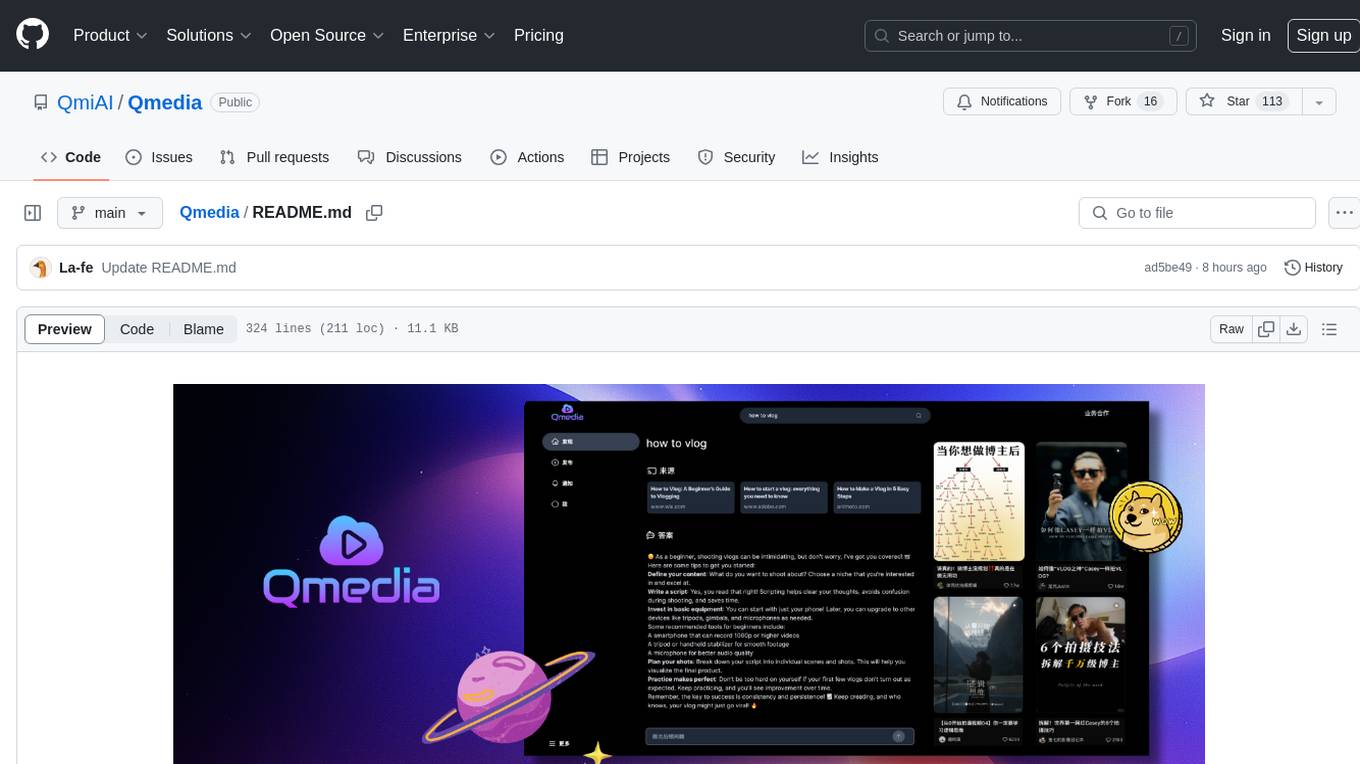
Qmedia
QMedia is an open-source multimedia AI content search engine designed specifically for content creators. It provides rich information extraction methods for text, image, and short video content. The tool integrates unstructured text, image, and short video information to build a multimodal RAG content Q&A system. Users can efficiently search for image/text and short video materials, analyze content, provide content sources, and generate customized search results based on user interests and needs. QMedia supports local deployment for offline content search and Q&A for private data. The tool offers features like content cards display, multimodal content RAG search, and pure local multimodal models deployment. Users can deploy different types of models locally, manage language models, feature embedding models, image models, and video models. QMedia aims to spark new ideas for content creation and share AI content creation concepts in an open-source manner.
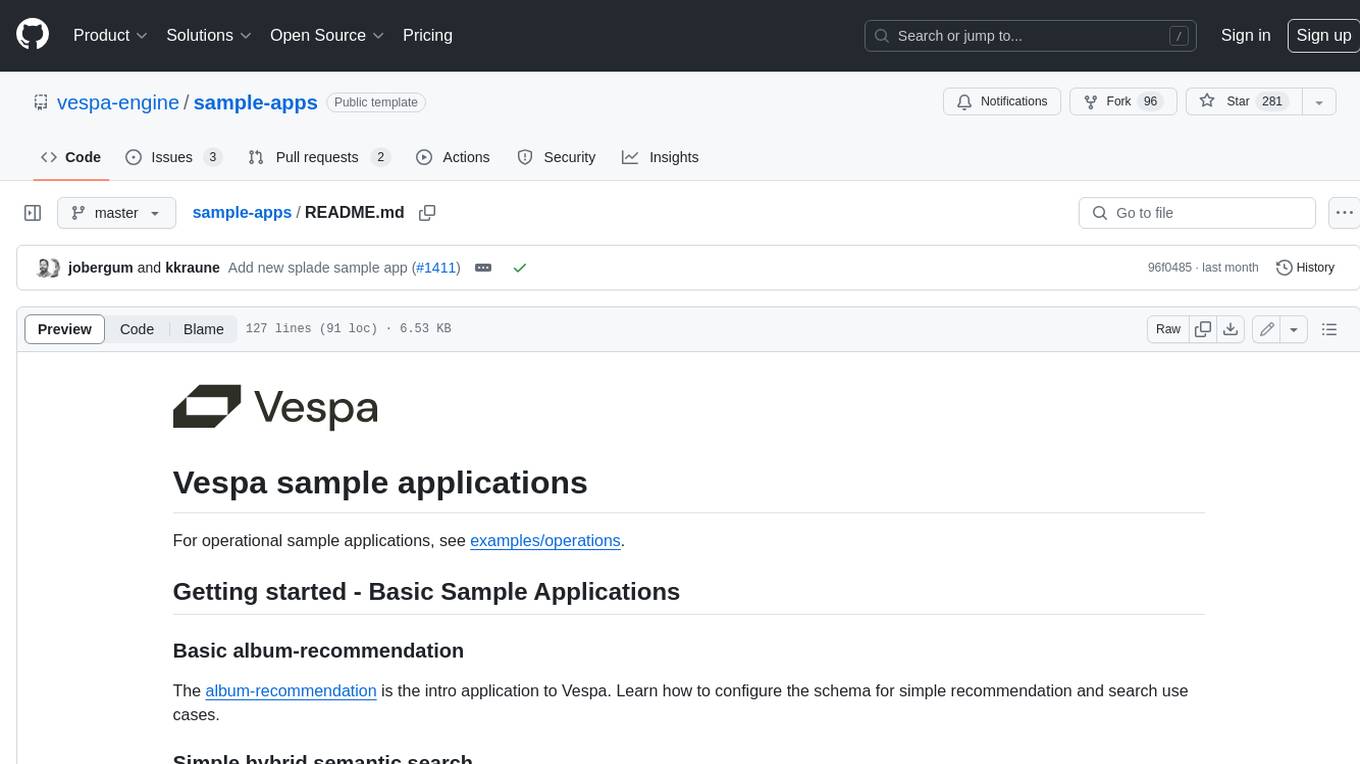
sample-apps
Vespa is an open-source search and AI engine that provides a unified platform for building and deploying search and AI applications. Vespa sample applications showcase various use cases and features of Vespa, including basic search, recommendation, semantic search, image search, text ranking, e-commerce search, question answering, search-as-you-type, and ML inference serving.
20 - OpenAI Gpts

AutoExpert (TV/Movies)
Search for TV and Movies, and learn what services offer them for streaming/rental/purchase.
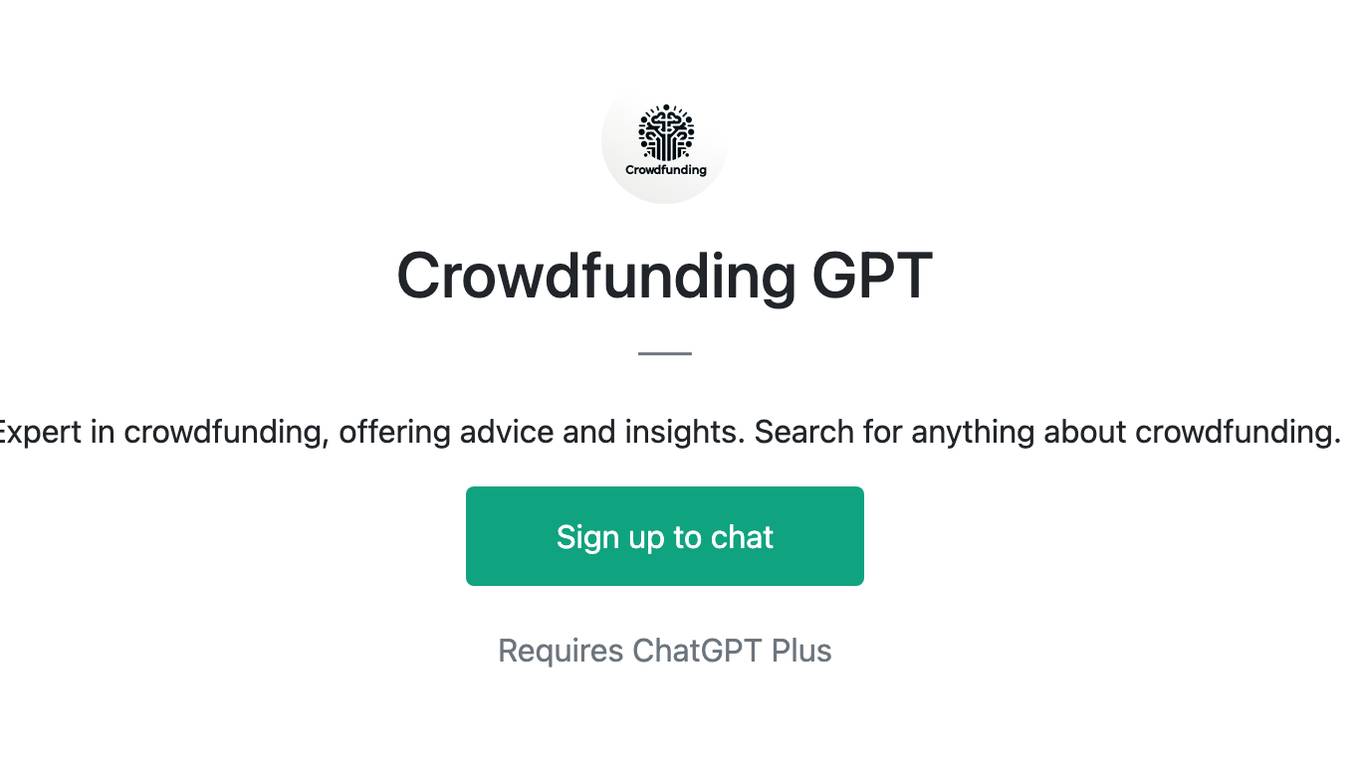
Crowdfunding GPT
Expert in crowdfunding, offering advice and insights. Search for anything about crowdfunding.
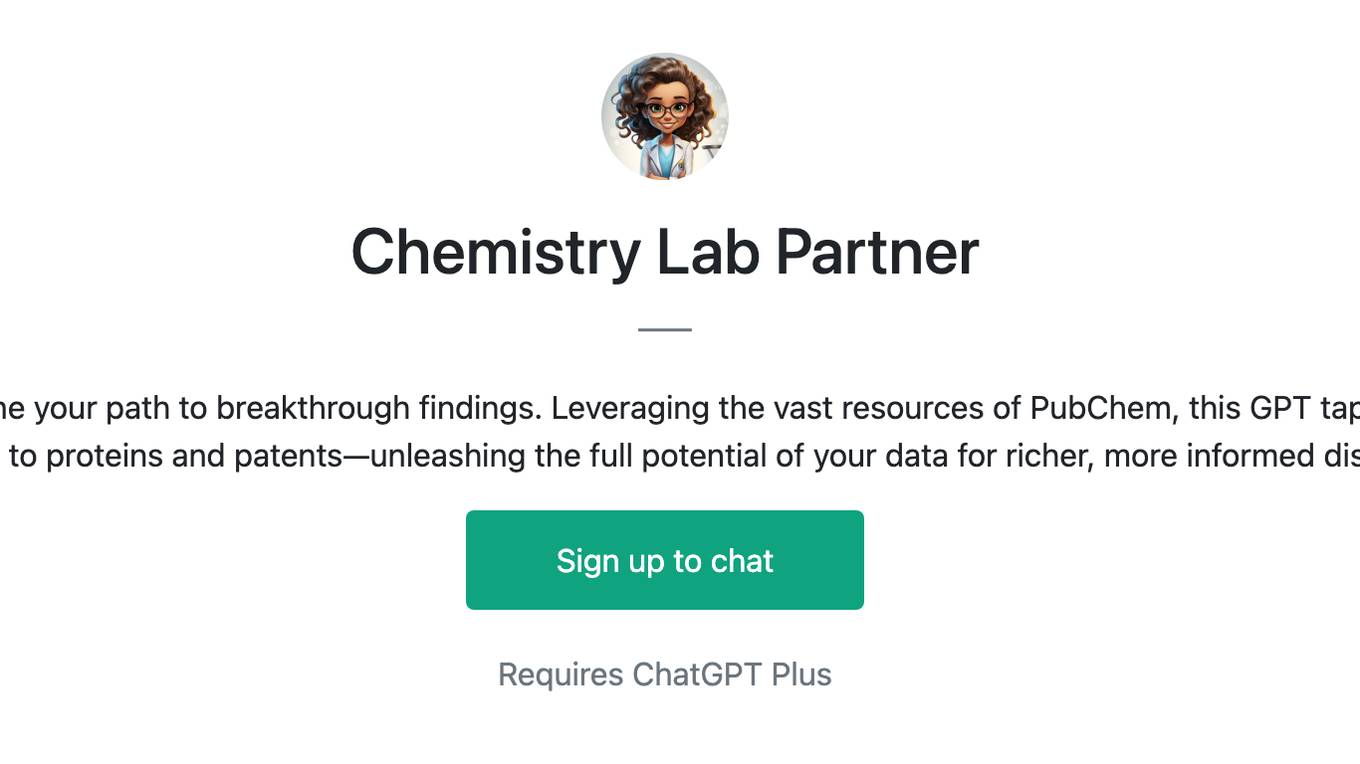
Chemistry Lab Partner
Turbocharge your research and streamline your path to breakthrough findings. Leveraging the vast resources of PubChem, this GPT taps into a wealth of chemical data—from substances to proteins and patents—unleashing the full potential of your data for richer, more informed discoveries.
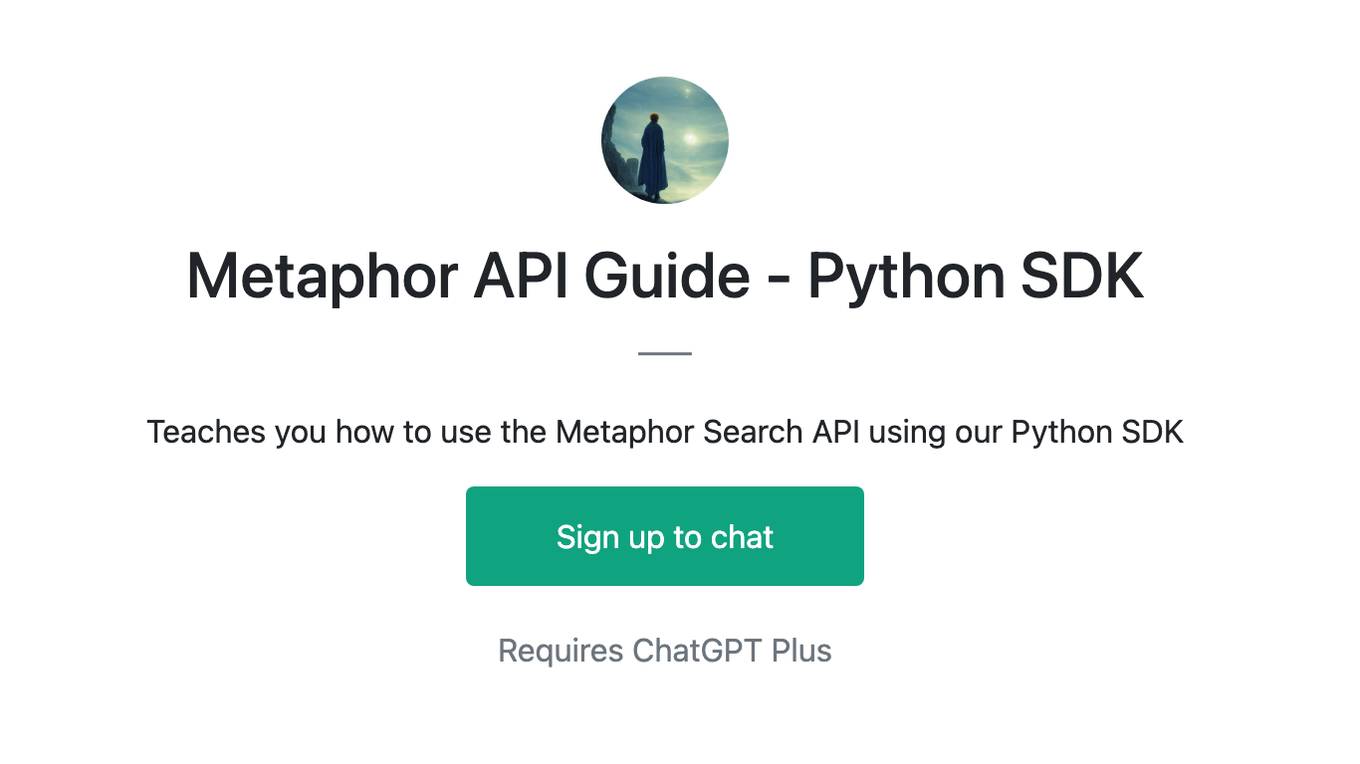
Metaphor API Guide - Python SDK
Teaches you how to use the Metaphor Search API using our Python SDK
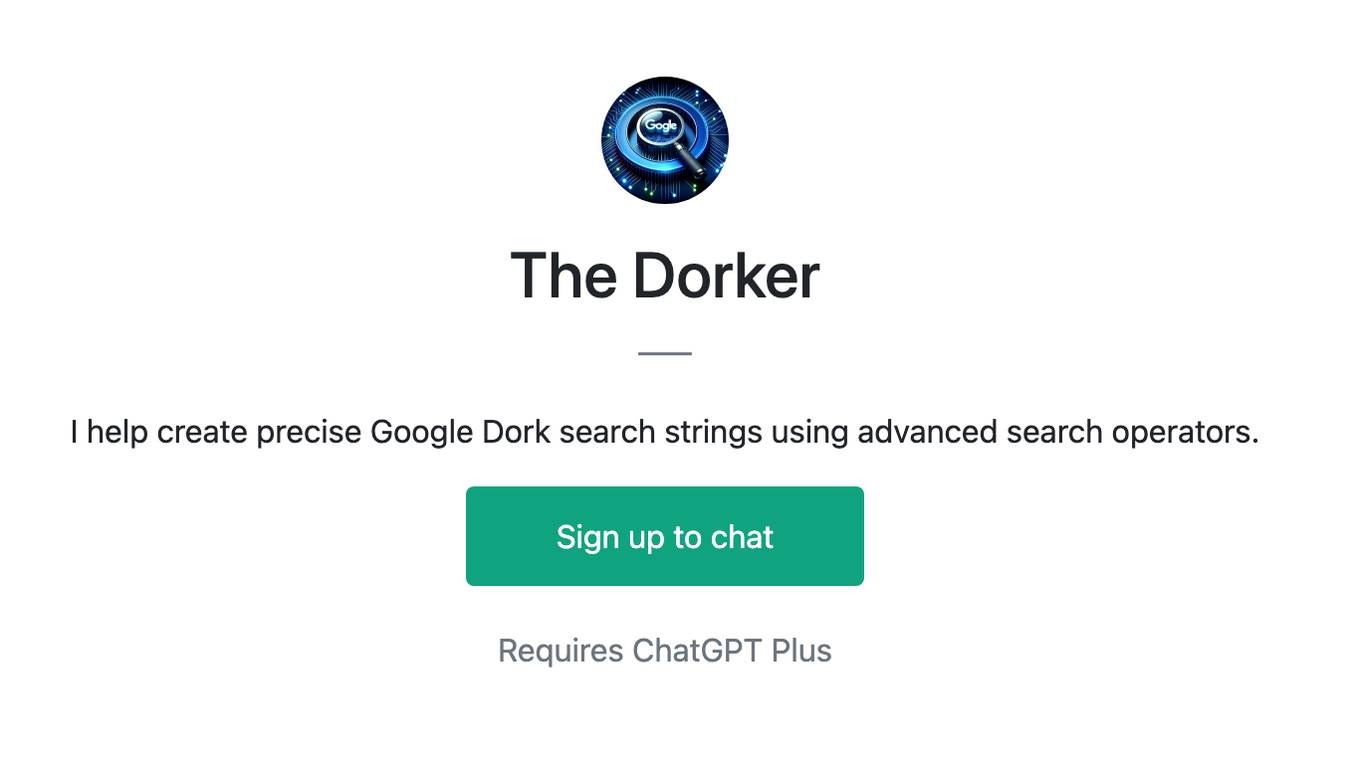
The Dorker
I help create precise Google Dork search strings using advanced search operators.
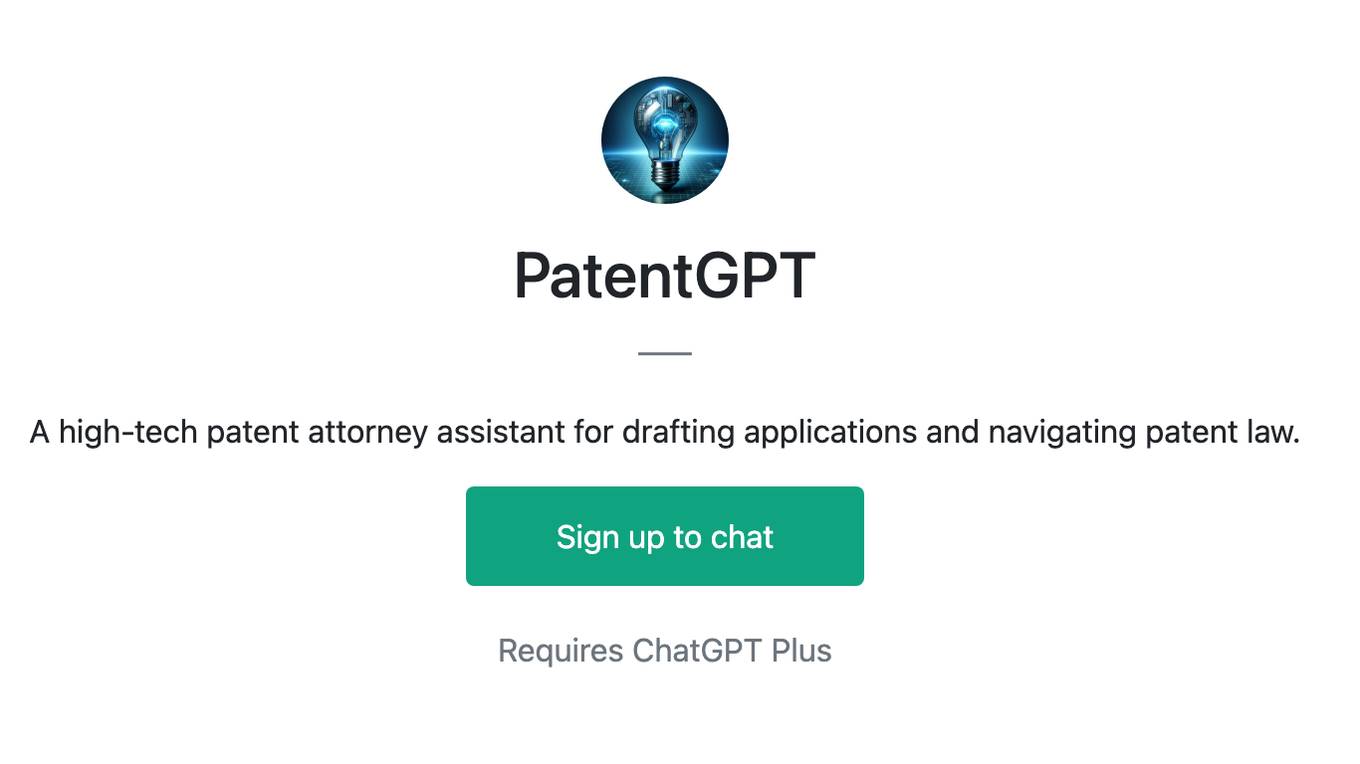
PatentGPT
A high-tech patent attorney assistant for drafting applications and navigating patent law.
GPT használata magyarul
A ChatGPT egy mesterséges intelligencián alapuló chatbot, amelyet az OpenAI fejlesztett ki. Ez a rendszer képes természetes nyelven kommunikálni, válaszokat adni kérdésekre, segítséget nyújtani szövegírásban, információkat keresni, és még sok másban.
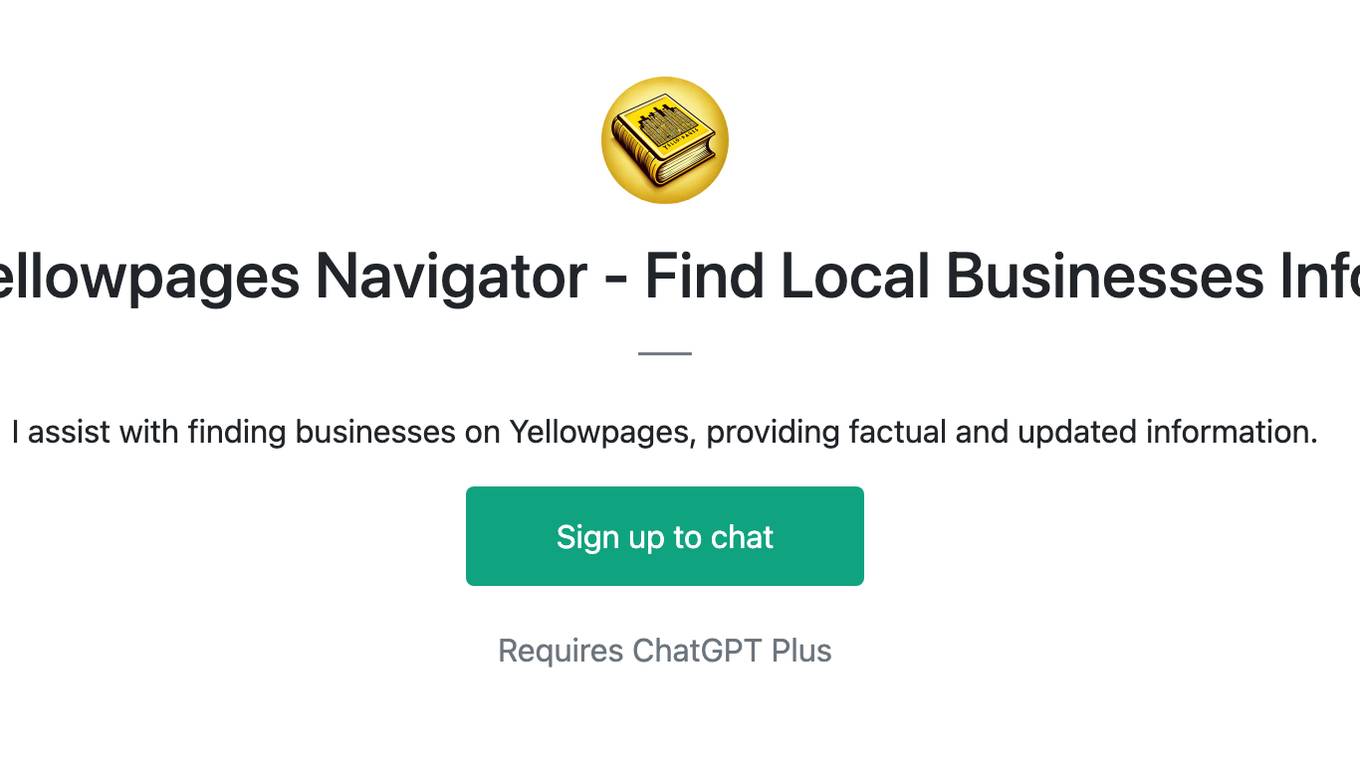
Yellowpages Navigator - Find Local Businesses Info
I assist with finding businesses on Yellowpages, providing factual and updated information.
